Ethical Decision-Making in Business
VerifiedAdded on 2020/02/24
|28
|6603
|177
AI Summary
This assignment delves into the complex realm of ethical decision-making within a business context. It examines various theoretical frameworks used to guide ethical choices, analyzes the factors influencing these decisions, and discusses the potential consequences of both ethical and unethical actions. The provided reading materials offer insights into organizational identification, brand management, authentic leadership, and the importance of ethical behavior in research and technology development.
Contribute Materials
Your contribution can guide someone’s learning journey. Share your
documents today.
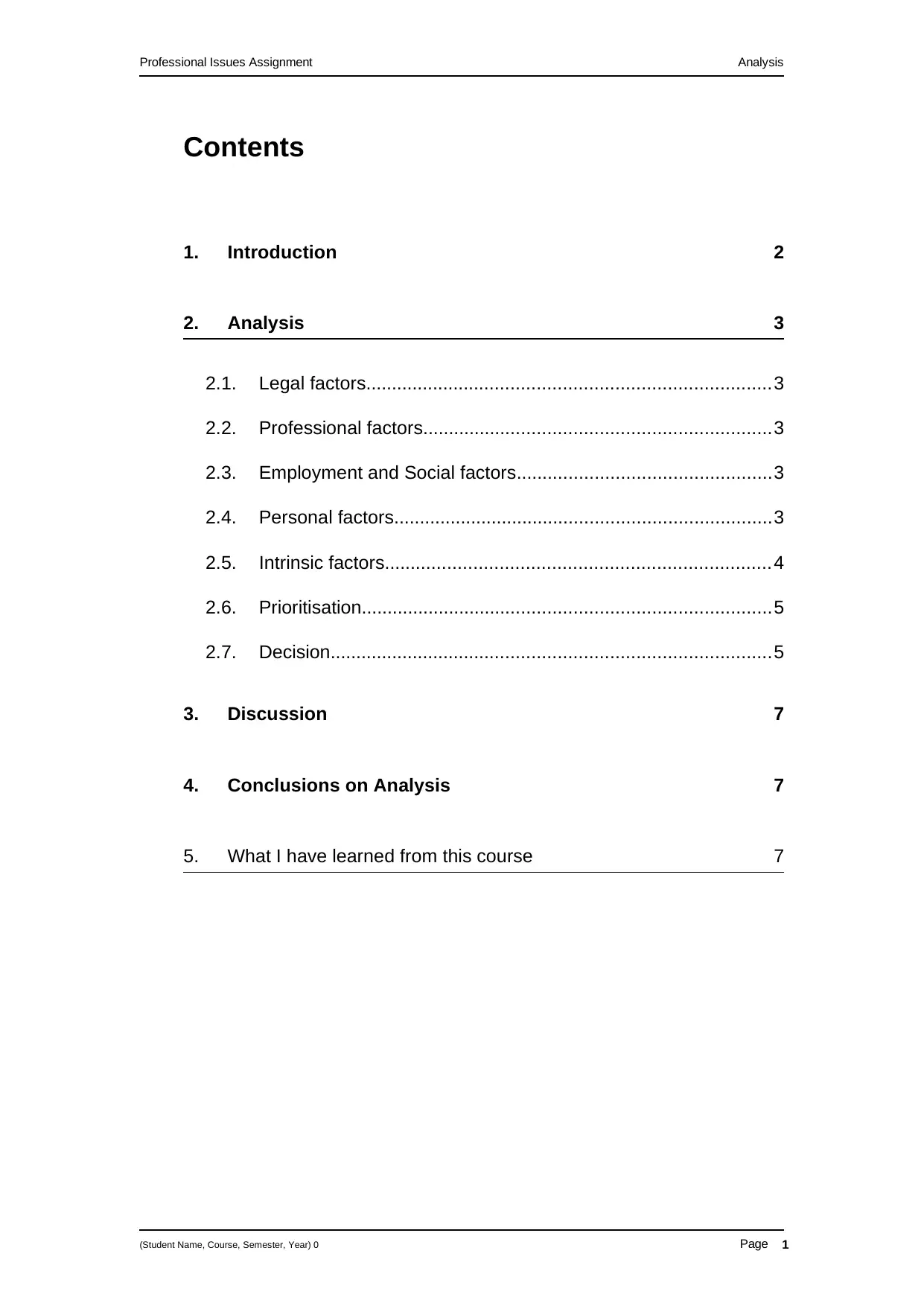
Professional Issues Assignment Analysis
Contents
1. Introduction 2
2. Analysis 3
2.1. Legal factors..............................................................................3
2.2. Professional factors...................................................................3
2.3. Employment and Social factors.................................................3
2.4. Personal factors.........................................................................3
2.5. Intrinsic factors..........................................................................4
2.6. Prioritisation...............................................................................5
2.7. Decision.....................................................................................5
3. Discussion 7
4. Conclusions on Analysis 7
5. What I have learned from this course 7
(Student Name, Course, Semester, Year) 0 Page 1
Contents
1. Introduction 2
2. Analysis 3
2.1. Legal factors..............................................................................3
2.2. Professional factors...................................................................3
2.3. Employment and Social factors.................................................3
2.4. Personal factors.........................................................................3
2.5. Intrinsic factors..........................................................................4
2.6. Prioritisation...............................................................................5
2.7. Decision.....................................................................................5
3. Discussion 7
4. Conclusions on Analysis 7
5. What I have learned from this course 7
(Student Name, Course, Semester, Year) 0 Page 1
Secure Best Marks with AI Grader
Need help grading? Try our AI Grader for instant feedback on your assignments.
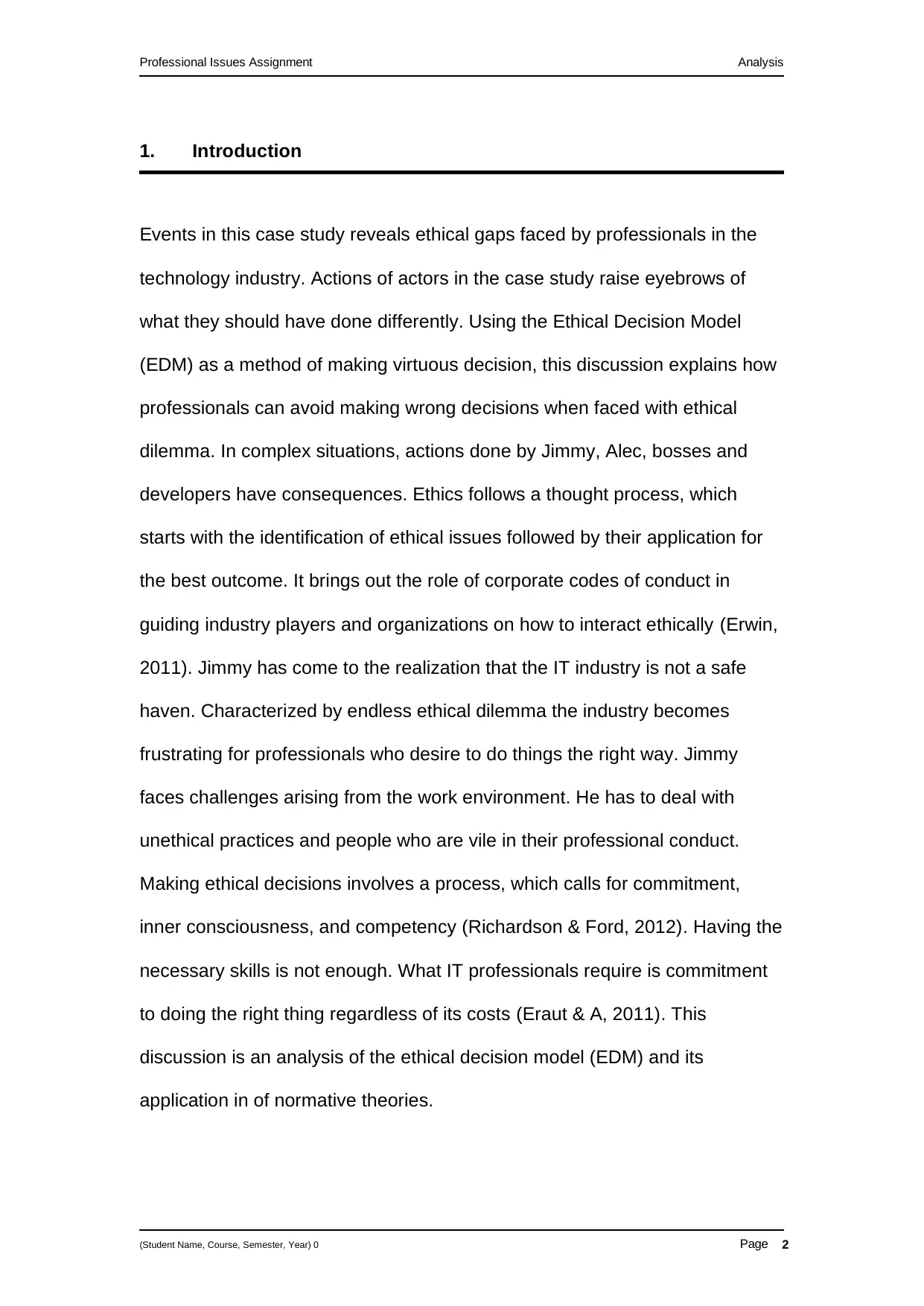
Professional Issues Assignment Analysis
1. Introduction
Events in this case study reveals ethical gaps faced by professionals in the
technology industry. Actions of actors in the case study raise eyebrows of
what they should have done differently. Using the Ethical Decision Model
(EDM) as a method of making virtuous decision, this discussion explains how
professionals can avoid making wrong decisions when faced with ethical
dilemma. In complex situations, actions done by Jimmy, Alec, bosses and
developers have consequences. Ethics follows a thought process, which
starts with the identification of ethical issues followed by their application for
the best outcome. It brings out the role of corporate codes of conduct in
guiding industry players and organizations on how to interact ethically (Erwin,
2011). Jimmy has come to the realization that the IT industry is not a safe
haven. Characterized by endless ethical dilemma the industry becomes
frustrating for professionals who desire to do things the right way. Jimmy
faces challenges arising from the work environment. He has to deal with
unethical practices and people who are vile in their professional conduct.
Making ethical decisions involves a process, which calls for commitment,
inner consciousness, and competency (Richardson & Ford, 2012). Having the
necessary skills is not enough. What IT professionals require is commitment
to doing the right thing regardless of its costs (Eraut & A, 2011). This
discussion is an analysis of the ethical decision model (EDM) and its
application in of normative theories.
(Student Name, Course, Semester, Year) 0 Page 2
1. Introduction
Events in this case study reveals ethical gaps faced by professionals in the
technology industry. Actions of actors in the case study raise eyebrows of
what they should have done differently. Using the Ethical Decision Model
(EDM) as a method of making virtuous decision, this discussion explains how
professionals can avoid making wrong decisions when faced with ethical
dilemma. In complex situations, actions done by Jimmy, Alec, bosses and
developers have consequences. Ethics follows a thought process, which
starts with the identification of ethical issues followed by their application for
the best outcome. It brings out the role of corporate codes of conduct in
guiding industry players and organizations on how to interact ethically (Erwin,
2011). Jimmy has come to the realization that the IT industry is not a safe
haven. Characterized by endless ethical dilemma the industry becomes
frustrating for professionals who desire to do things the right way. Jimmy
faces challenges arising from the work environment. He has to deal with
unethical practices and people who are vile in their professional conduct.
Making ethical decisions involves a process, which calls for commitment,
inner consciousness, and competency (Richardson & Ford, 2012). Having the
necessary skills is not enough. What IT professionals require is commitment
to doing the right thing regardless of its costs (Eraut & A, 2011). This
discussion is an analysis of the ethical decision model (EDM) and its
application in of normative theories.
(Student Name, Course, Semester, Year) 0 Page 2
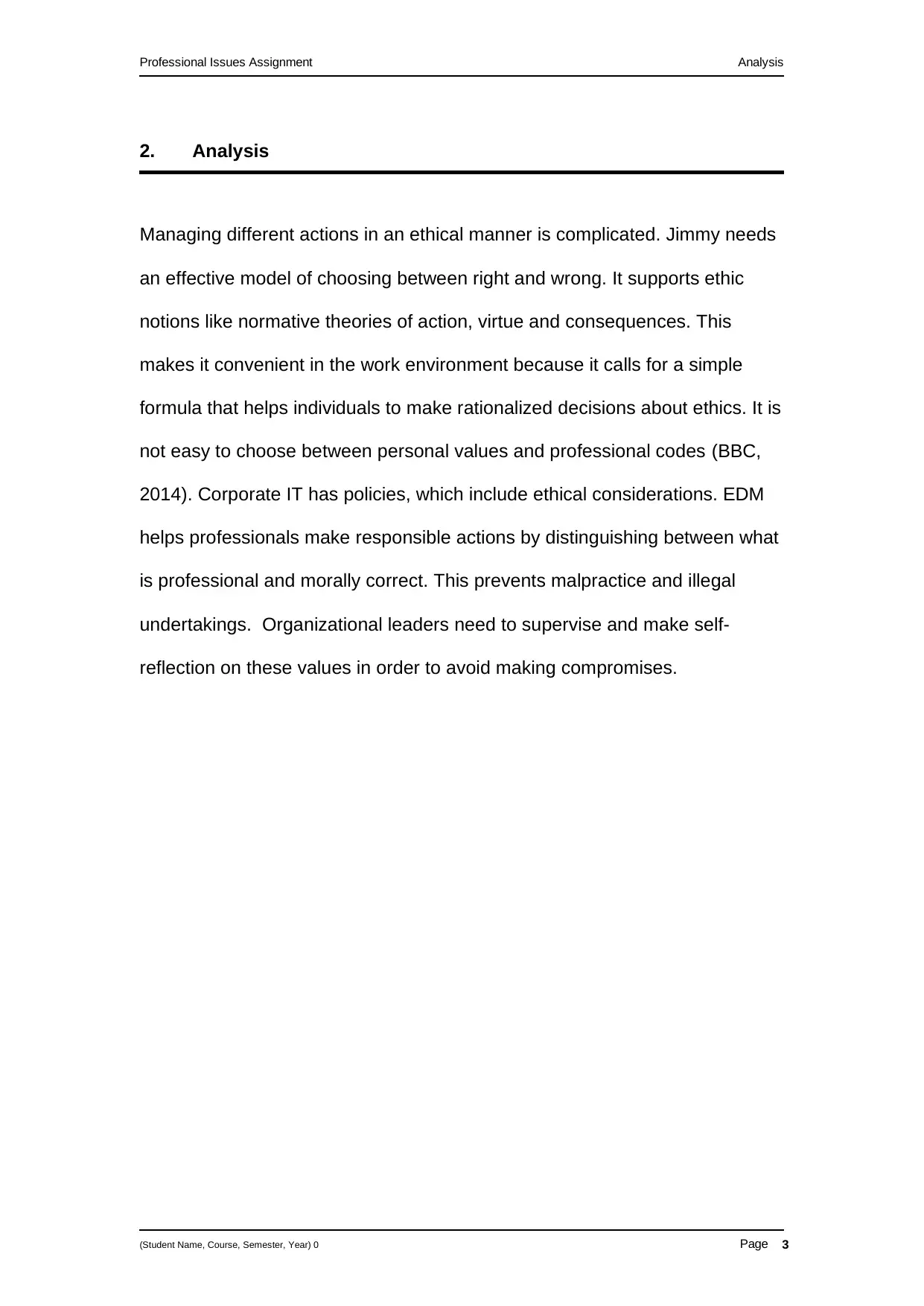
Professional Issues Assignment Analysis
2. Analysis
Managing different actions in an ethical manner is complicated. Jimmy needs
an effective model of choosing between right and wrong. It supports ethic
notions like normative theories of action, virtue and consequences. This
makes it convenient in the work environment because it calls for a simple
formula that helps individuals to make rationalized decisions about ethics. It is
not easy to choose between personal values and professional codes (BBC,
2014). Corporate IT has policies, which include ethical considerations. EDM
helps professionals make responsible actions by distinguishing between what
is professional and morally correct. This prevents malpractice and illegal
undertakings. Organizational leaders need to supervise and make self-
reflection on these values in order to avoid making compromises.
(Student Name, Course, Semester, Year) 0 Page 3
2. Analysis
Managing different actions in an ethical manner is complicated. Jimmy needs
an effective model of choosing between right and wrong. It supports ethic
notions like normative theories of action, virtue and consequences. This
makes it convenient in the work environment because it calls for a simple
formula that helps individuals to make rationalized decisions about ethics. It is
not easy to choose between personal values and professional codes (BBC,
2014). Corporate IT has policies, which include ethical considerations. EDM
helps professionals make responsible actions by distinguishing between what
is professional and morally correct. This prevents malpractice and illegal
undertakings. Organizational leaders need to supervise and make self-
reflection on these values in order to avoid making compromises.
(Student Name, Course, Semester, Year) 0 Page 3
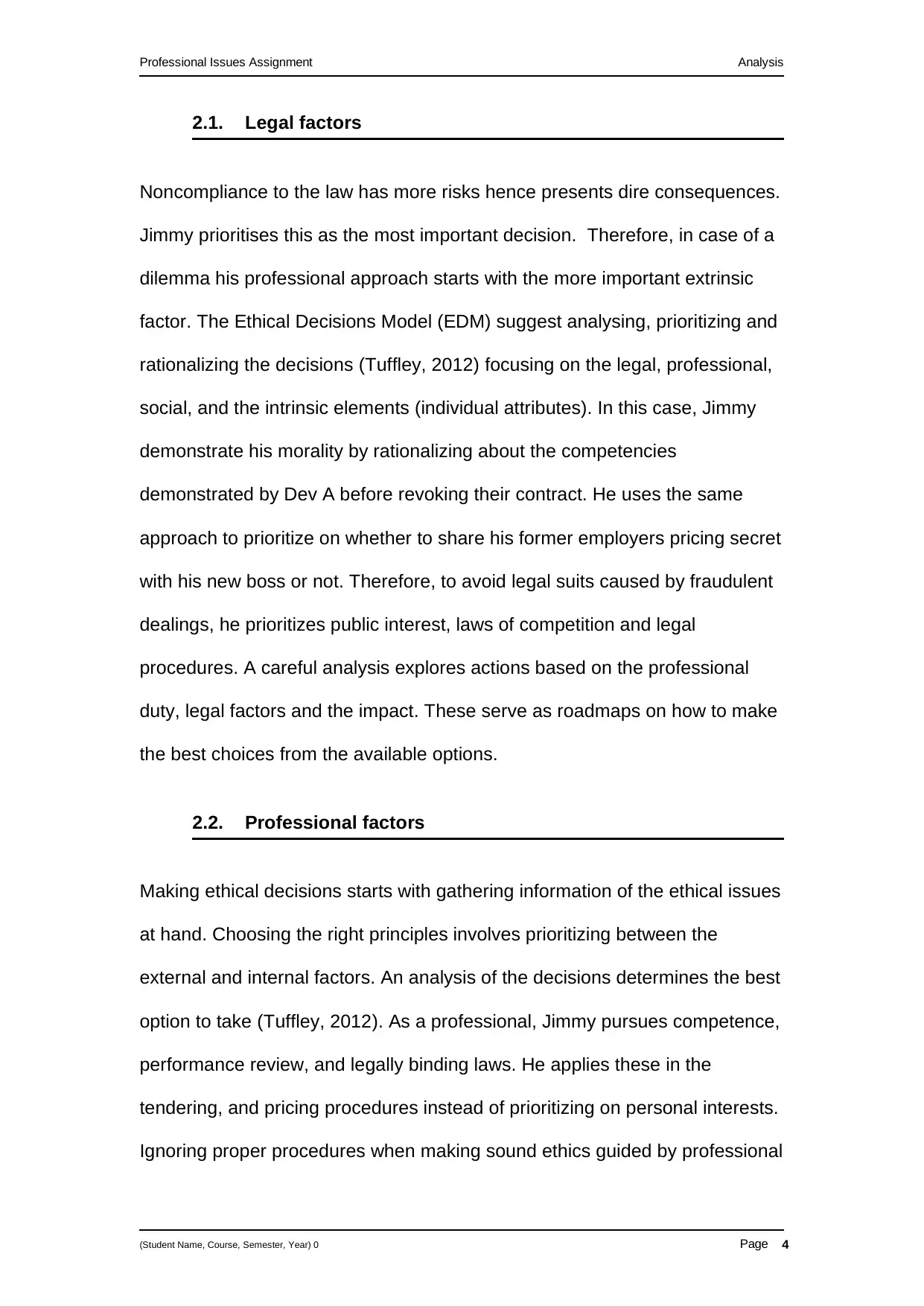
Professional Issues Assignment Analysis
2.1. Legal factors
Noncompliance to the law has more risks hence presents dire consequences.
Jimmy prioritises this as the most important decision. Therefore, in case of a
dilemma his professional approach starts with the more important extrinsic
factor. The Ethical Decisions Model (EDM) suggest analysing, prioritizing and
rationalizing the decisions (Tuffley, 2012) focusing on the legal, professional,
social, and the intrinsic elements (individual attributes). In this case, Jimmy
demonstrate his morality by rationalizing about the competencies
demonstrated by Dev A before revoking their contract. He uses the same
approach to prioritize on whether to share his former employers pricing secret
with his new boss or not. Therefore, to avoid legal suits caused by fraudulent
dealings, he prioritizes public interest, laws of competition and legal
procedures. A careful analysis explores actions based on the professional
duty, legal factors and the impact. These serve as roadmaps on how to make
the best choices from the available options.
2.2. Professional factors
Making ethical decisions starts with gathering information of the ethical issues
at hand. Choosing the right principles involves prioritizing between the
external and internal factors. An analysis of the decisions determines the best
option to take (Tuffley, 2012). As a professional, Jimmy pursues competence,
performance review, and legally binding laws. He applies these in the
tendering, and pricing procedures instead of prioritizing on personal interests.
Ignoring proper procedures when making sound ethics guided by professional
(Student Name, Course, Semester, Year) 0 Page 4
2.1. Legal factors
Noncompliance to the law has more risks hence presents dire consequences.
Jimmy prioritises this as the most important decision. Therefore, in case of a
dilemma his professional approach starts with the more important extrinsic
factor. The Ethical Decisions Model (EDM) suggest analysing, prioritizing and
rationalizing the decisions (Tuffley, 2012) focusing on the legal, professional,
social, and the intrinsic elements (individual attributes). In this case, Jimmy
demonstrate his morality by rationalizing about the competencies
demonstrated by Dev A before revoking their contract. He uses the same
approach to prioritize on whether to share his former employers pricing secret
with his new boss or not. Therefore, to avoid legal suits caused by fraudulent
dealings, he prioritizes public interest, laws of competition and legal
procedures. A careful analysis explores actions based on the professional
duty, legal factors and the impact. These serve as roadmaps on how to make
the best choices from the available options.
2.2. Professional factors
Making ethical decisions starts with gathering information of the ethical issues
at hand. Choosing the right principles involves prioritizing between the
external and internal factors. An analysis of the decisions determines the best
option to take (Tuffley, 2012). As a professional, Jimmy pursues competence,
performance review, and legally binding laws. He applies these in the
tendering, and pricing procedures instead of prioritizing on personal interests.
Ignoring proper procedures when making sound ethics guided by professional
(Student Name, Course, Semester, Year) 0 Page 4
Secure Best Marks with AI Grader
Need help grading? Try our AI Grader for instant feedback on your assignments.
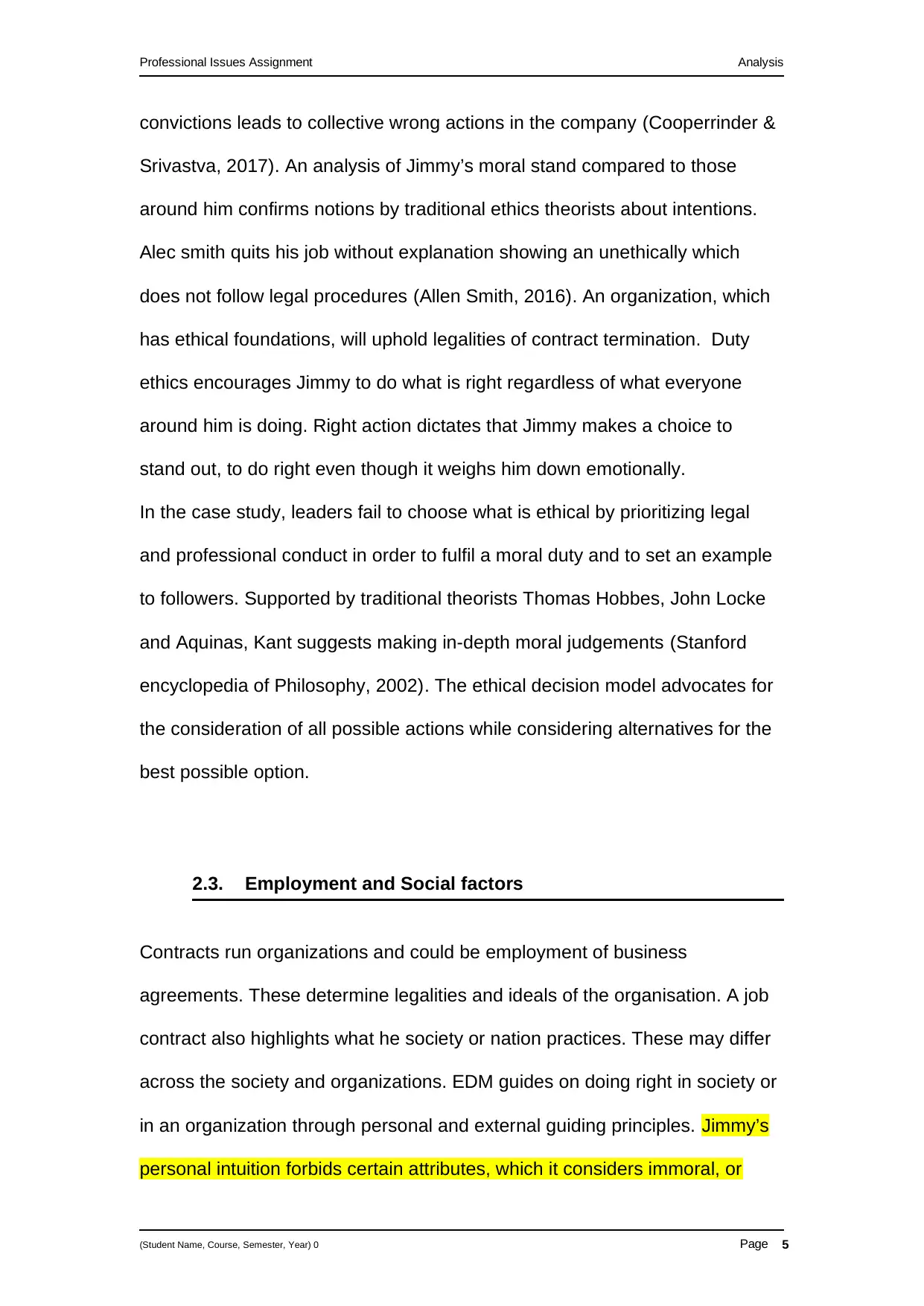
Professional Issues Assignment Analysis
convictions leads to collective wrong actions in the company (Cooperrinder &
Srivastva, 2017). An analysis of Jimmy’s moral stand compared to those
around him confirms notions by traditional ethics theorists about intentions.
Alec smith quits his job without explanation showing an unethically which
does not follow legal procedures (Allen Smith, 2016). An organization, which
has ethical foundations, will uphold legalities of contract termination. Duty
ethics encourages Jimmy to do what is right regardless of what everyone
around him is doing. Right action dictates that Jimmy makes a choice to
stand out, to do right even though it weighs him down emotionally.
In the case study, leaders fail to choose what is ethical by prioritizing legal
and professional conduct in order to fulfil a moral duty and to set an example
to followers. Supported by traditional theorists Thomas Hobbes, John Locke
and Aquinas, Kant suggests making in-depth moral judgements (Stanford
encyclopedia of Philosophy, 2002). The ethical decision model advocates for
the consideration of all possible actions while considering alternatives for the
best possible option.
2.3. Employment and Social factors
Contracts run organizations and could be employment of business
agreements. These determine legalities and ideals of the organisation. A job
contract also highlights what he society or nation practices. These may differ
across the society and organizations. EDM guides on doing right in society or
in an organization through personal and external guiding principles. Jimmy’s
personal intuition forbids certain attributes, which it considers immoral, or
(Student Name, Course, Semester, Year) 0 Page 5
convictions leads to collective wrong actions in the company (Cooperrinder &
Srivastva, 2017). An analysis of Jimmy’s moral stand compared to those
around him confirms notions by traditional ethics theorists about intentions.
Alec smith quits his job without explanation showing an unethically which
does not follow legal procedures (Allen Smith, 2016). An organization, which
has ethical foundations, will uphold legalities of contract termination. Duty
ethics encourages Jimmy to do what is right regardless of what everyone
around him is doing. Right action dictates that Jimmy makes a choice to
stand out, to do right even though it weighs him down emotionally.
In the case study, leaders fail to choose what is ethical by prioritizing legal
and professional conduct in order to fulfil a moral duty and to set an example
to followers. Supported by traditional theorists Thomas Hobbes, John Locke
and Aquinas, Kant suggests making in-depth moral judgements (Stanford
encyclopedia of Philosophy, 2002). The ethical decision model advocates for
the consideration of all possible actions while considering alternatives for the
best possible option.
2.3. Employment and Social factors
Contracts run organizations and could be employment of business
agreements. These determine legalities and ideals of the organisation. A job
contract also highlights what he society or nation practices. These may differ
across the society and organizations. EDM guides on doing right in society or
in an organization through personal and external guiding principles. Jimmy’s
personal intuition forbids certain attributes, which it considers immoral, or
(Student Name, Course, Semester, Year) 0 Page 5
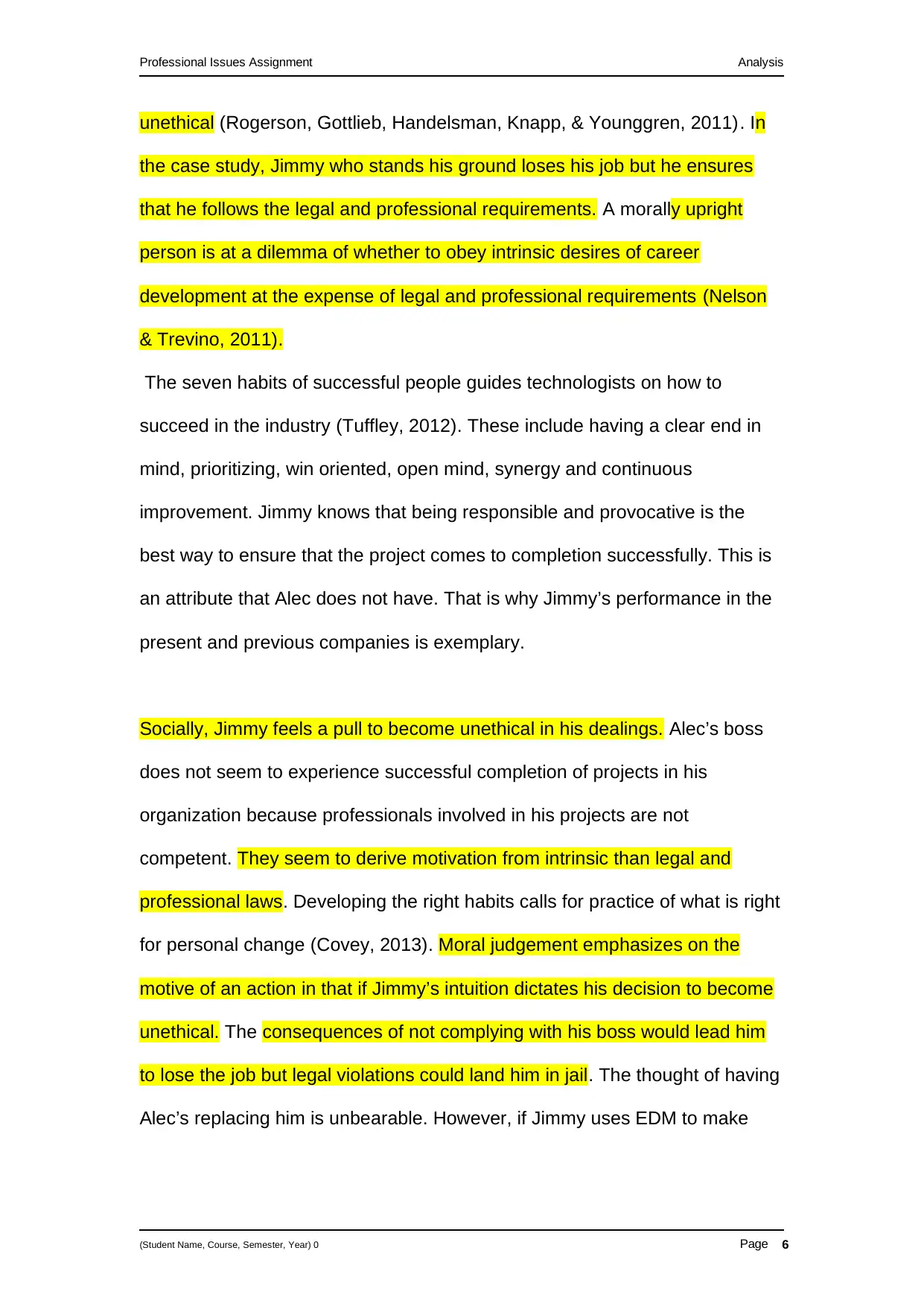
Professional Issues Assignment Analysis
unethical (Rogerson, Gottlieb, Handelsman, Knapp, & Younggren, 2011). In
the case study, Jimmy who stands his ground loses his job but he ensures
that he follows the legal and professional requirements. A morally upright
person is at a dilemma of whether to obey intrinsic desires of career
development at the expense of legal and professional requirements (Nelson
& Trevino, 2011).
The seven habits of successful people guides technologists on how to
succeed in the industry (Tuffley, 2012). These include having a clear end in
mind, prioritizing, win oriented, open mind, synergy and continuous
improvement. Jimmy knows that being responsible and provocative is the
best way to ensure that the project comes to completion successfully. This is
an attribute that Alec does not have. That is why Jimmy’s performance in the
present and previous companies is exemplary.
Socially, Jimmy feels a pull to become unethical in his dealings. Alec’s boss
does not seem to experience successful completion of projects in his
organization because professionals involved in his projects are not
competent. They seem to derive motivation from intrinsic than legal and
professional laws. Developing the right habits calls for practice of what is right
for personal change (Covey, 2013). Moral judgement emphasizes on the
motive of an action in that if Jimmy’s intuition dictates his decision to become
unethical. The consequences of not complying with his boss would lead him
to lose the job but legal violations could land him in jail. The thought of having
Alec’s replacing him is unbearable. However, if Jimmy uses EDM to make
(Student Name, Course, Semester, Year) 0 Page 6
unethical (Rogerson, Gottlieb, Handelsman, Knapp, & Younggren, 2011). In
the case study, Jimmy who stands his ground loses his job but he ensures
that he follows the legal and professional requirements. A morally upright
person is at a dilemma of whether to obey intrinsic desires of career
development at the expense of legal and professional requirements (Nelson
& Trevino, 2011).
The seven habits of successful people guides technologists on how to
succeed in the industry (Tuffley, 2012). These include having a clear end in
mind, prioritizing, win oriented, open mind, synergy and continuous
improvement. Jimmy knows that being responsible and provocative is the
best way to ensure that the project comes to completion successfully. This is
an attribute that Alec does not have. That is why Jimmy’s performance in the
present and previous companies is exemplary.
Socially, Jimmy feels a pull to become unethical in his dealings. Alec’s boss
does not seem to experience successful completion of projects in his
organization because professionals involved in his projects are not
competent. They seem to derive motivation from intrinsic than legal and
professional laws. Developing the right habits calls for practice of what is right
for personal change (Covey, 2013). Moral judgement emphasizes on the
motive of an action in that if Jimmy’s intuition dictates his decision to become
unethical. The consequences of not complying with his boss would lead him
to lose the job but legal violations could land him in jail. The thought of having
Alec’s replacing him is unbearable. However, if Jimmy uses EDM to make
(Student Name, Course, Semester, Year) 0 Page 6
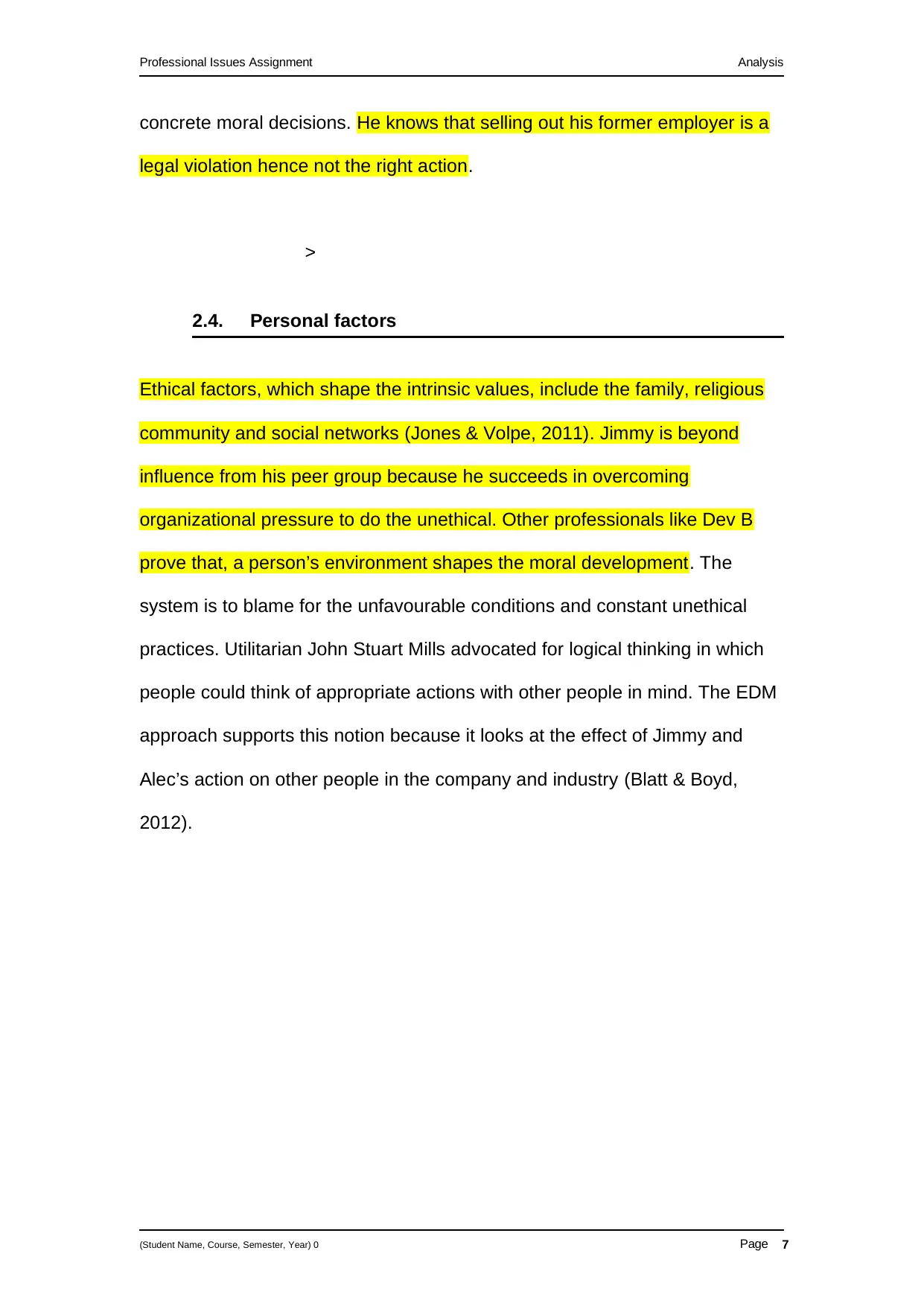
Professional Issues Assignment Analysis
concrete moral decisions. He knows that selling out his former employer is a
legal violation hence not the right action.
>
2.4. Personal factors
Ethical factors, which shape the intrinsic values, include the family, religious
community and social networks (Jones & Volpe, 2011). Jimmy is beyond
influence from his peer group because he succeeds in overcoming
organizational pressure to do the unethical. Other professionals like Dev B
prove that, a person’s environment shapes the moral development. The
system is to blame for the unfavourable conditions and constant unethical
practices. Utilitarian John Stuart Mills advocated for logical thinking in which
people could think of appropriate actions with other people in mind. The EDM
approach supports this notion because it looks at the effect of Jimmy and
Alec’s action on other people in the company and industry (Blatt & Boyd,
2012).
(Student Name, Course, Semester, Year) 0 Page 7
concrete moral decisions. He knows that selling out his former employer is a
legal violation hence not the right action.
>
2.4. Personal factors
Ethical factors, which shape the intrinsic values, include the family, religious
community and social networks (Jones & Volpe, 2011). Jimmy is beyond
influence from his peer group because he succeeds in overcoming
organizational pressure to do the unethical. Other professionals like Dev B
prove that, a person’s environment shapes the moral development. The
system is to blame for the unfavourable conditions and constant unethical
practices. Utilitarian John Stuart Mills advocated for logical thinking in which
people could think of appropriate actions with other people in mind. The EDM
approach supports this notion because it looks at the effect of Jimmy and
Alec’s action on other people in the company and industry (Blatt & Boyd,
2012).
(Student Name, Course, Semester, Year) 0 Page 7
Paraphrase This Document
Need a fresh take? Get an instant paraphrase of this document with our AI Paraphraser
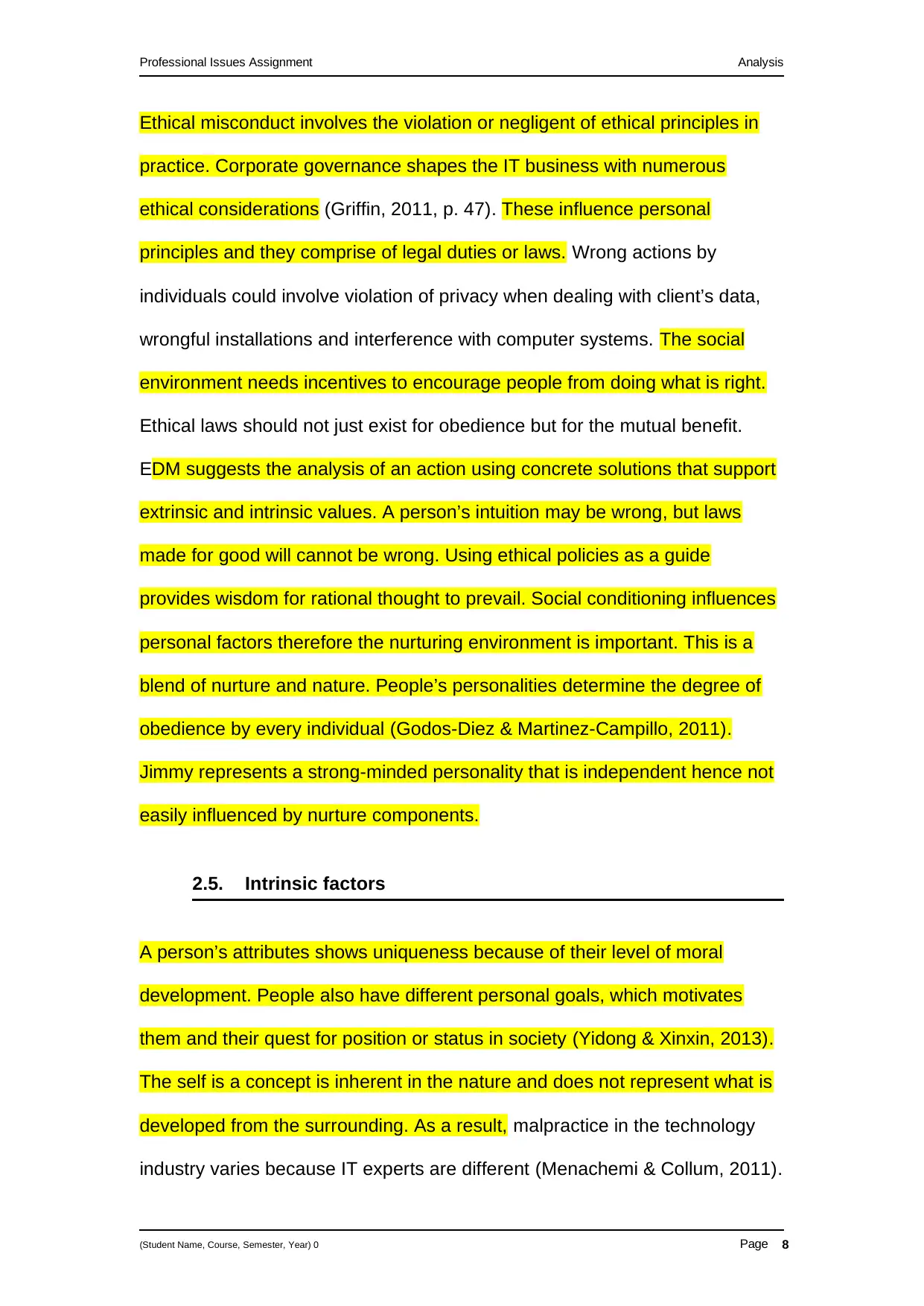
Professional Issues Assignment Analysis
Ethical misconduct involves the violation or negligent of ethical principles in
practice. Corporate governance shapes the IT business with numerous
ethical considerations (Griffin, 2011, p. 47). These influence personal
principles and they comprise of legal duties or laws. Wrong actions by
individuals could involve violation of privacy when dealing with client’s data,
wrongful installations and interference with computer systems. The social
environment needs incentives to encourage people from doing what is right.
Ethical laws should not just exist for obedience but for the mutual benefit.
EDM suggests the analysis of an action using concrete solutions that support
extrinsic and intrinsic values. A person’s intuition may be wrong, but laws
made for good will cannot be wrong. Using ethical policies as a guide
provides wisdom for rational thought to prevail. Social conditioning influences
personal factors therefore the nurturing environment is important. This is a
blend of nurture and nature. People’s personalities determine the degree of
obedience by every individual (Godos-Diez & Martinez-Campillo, 2011).
Jimmy represents a strong-minded personality that is independent hence not
easily influenced by nurture components.
2.5. Intrinsic factors
A person’s attributes shows uniqueness because of their level of moral
development. People also have different personal goals, which motivates
them and their quest for position or status in society (Yidong & Xinxin, 2013).
The self is a concept is inherent in the nature and does not represent what is
developed from the surrounding. As a result, malpractice in the technology
industry varies because IT experts are different (Menachemi & Collum, 2011).
(Student Name, Course, Semester, Year) 0 Page 8
Ethical misconduct involves the violation or negligent of ethical principles in
practice. Corporate governance shapes the IT business with numerous
ethical considerations (Griffin, 2011, p. 47). These influence personal
principles and they comprise of legal duties or laws. Wrong actions by
individuals could involve violation of privacy when dealing with client’s data,
wrongful installations and interference with computer systems. The social
environment needs incentives to encourage people from doing what is right.
Ethical laws should not just exist for obedience but for the mutual benefit.
EDM suggests the analysis of an action using concrete solutions that support
extrinsic and intrinsic values. A person’s intuition may be wrong, but laws
made for good will cannot be wrong. Using ethical policies as a guide
provides wisdom for rational thought to prevail. Social conditioning influences
personal factors therefore the nurturing environment is important. This is a
blend of nurture and nature. People’s personalities determine the degree of
obedience by every individual (Godos-Diez & Martinez-Campillo, 2011).
Jimmy represents a strong-minded personality that is independent hence not
easily influenced by nurture components.
2.5. Intrinsic factors
A person’s attributes shows uniqueness because of their level of moral
development. People also have different personal goals, which motivates
them and their quest for position or status in society (Yidong & Xinxin, 2013).
The self is a concept is inherent in the nature and does not represent what is
developed from the surrounding. As a result, malpractice in the technology
industry varies because IT experts are different (Menachemi & Collum, 2011).
(Student Name, Course, Semester, Year) 0 Page 8
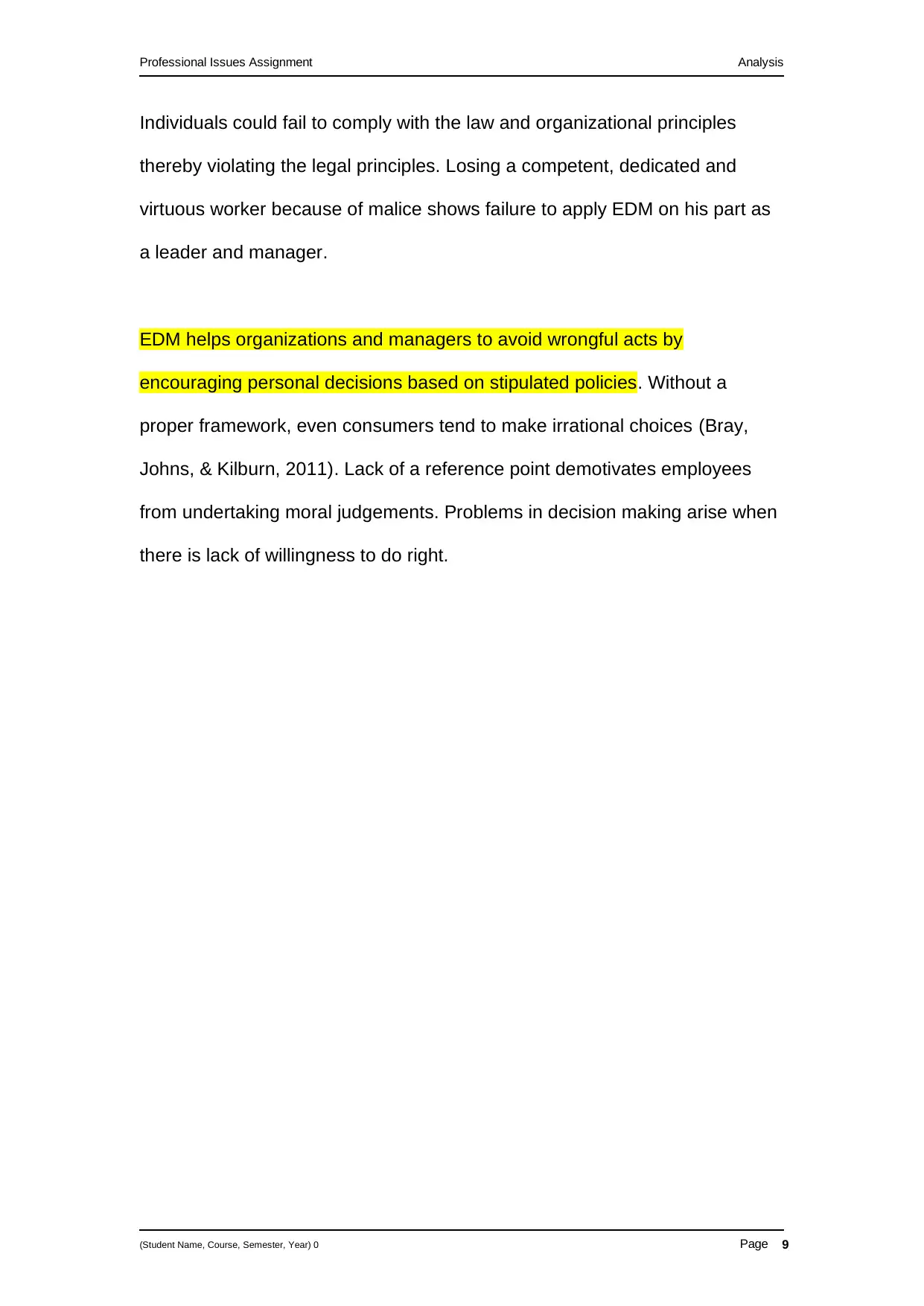
Professional Issues Assignment Analysis
Individuals could fail to comply with the law and organizational principles
thereby violating the legal principles. Losing a competent, dedicated and
virtuous worker because of malice shows failure to apply EDM on his part as
a leader and manager.
EDM helps organizations and managers to avoid wrongful acts by
encouraging personal decisions based on stipulated policies. Without a
proper framework, even consumers tend to make irrational choices (Bray,
Johns, & Kilburn, 2011). Lack of a reference point demotivates employees
from undertaking moral judgements. Problems in decision making arise when
there is lack of willingness to do right.
(Student Name, Course, Semester, Year) 0 Page 9
Individuals could fail to comply with the law and organizational principles
thereby violating the legal principles. Losing a competent, dedicated and
virtuous worker because of malice shows failure to apply EDM on his part as
a leader and manager.
EDM helps organizations and managers to avoid wrongful acts by
encouraging personal decisions based on stipulated policies. Without a
proper framework, even consumers tend to make irrational choices (Bray,
Johns, & Kilburn, 2011). Lack of a reference point demotivates employees
from undertaking moral judgements. Problems in decision making arise when
there is lack of willingness to do right.
(Student Name, Course, Semester, Year) 0 Page 9
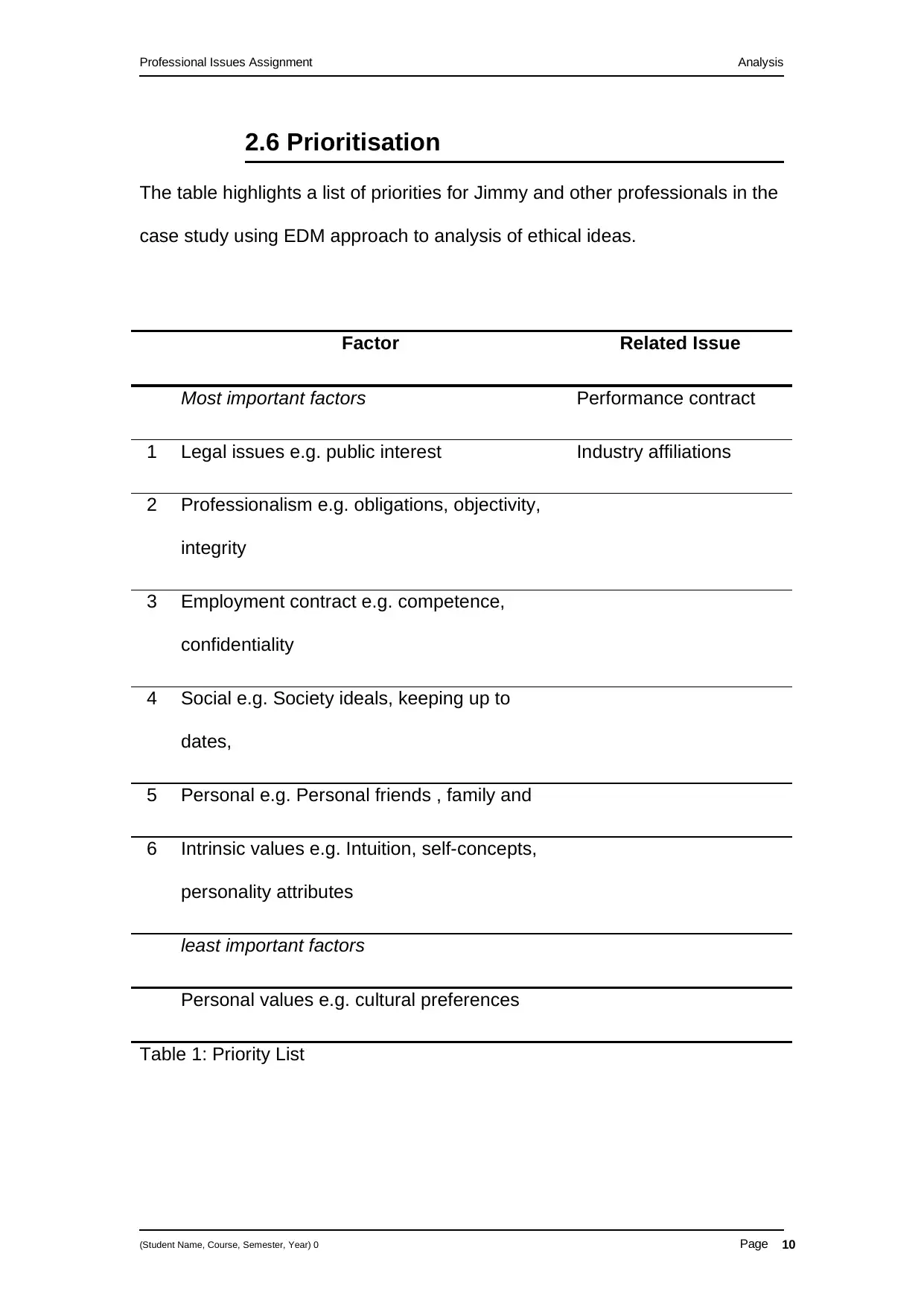
Professional Issues Assignment Analysis
2.6 Prioritisation
The table highlights a list of priorities for Jimmy and other professionals in the
case study using EDM approach to analysis of ethical ideas.
Factor Related Issue
Most important factors Performance contract
1 Legal issues e.g. public interest Industry affiliations
2 Professionalism e.g. obligations, objectivity,
integrity
3 Employment contract e.g. competence,
confidentiality
4 Social e.g. Society ideals, keeping up to
dates,
5 Personal e.g. Personal friends , family and
6 Intrinsic values e.g. Intuition, self-concepts,
personality attributes
least important factors
Personal values e.g. cultural preferences
Table 1: Priority List
(Student Name, Course, Semester, Year) 0 Page 10
2.6 Prioritisation
The table highlights a list of priorities for Jimmy and other professionals in the
case study using EDM approach to analysis of ethical ideas.
Factor Related Issue
Most important factors Performance contract
1 Legal issues e.g. public interest Industry affiliations
2 Professionalism e.g. obligations, objectivity,
integrity
3 Employment contract e.g. competence,
confidentiality
4 Social e.g. Society ideals, keeping up to
dates,
5 Personal e.g. Personal friends , family and
6 Intrinsic values e.g. Intuition, self-concepts,
personality attributes
least important factors
Personal values e.g. cultural preferences
Table 1: Priority List
(Student Name, Course, Semester, Year) 0 Page 10
Secure Best Marks with AI Grader
Need help grading? Try our AI Grader for instant feedback on your assignments.
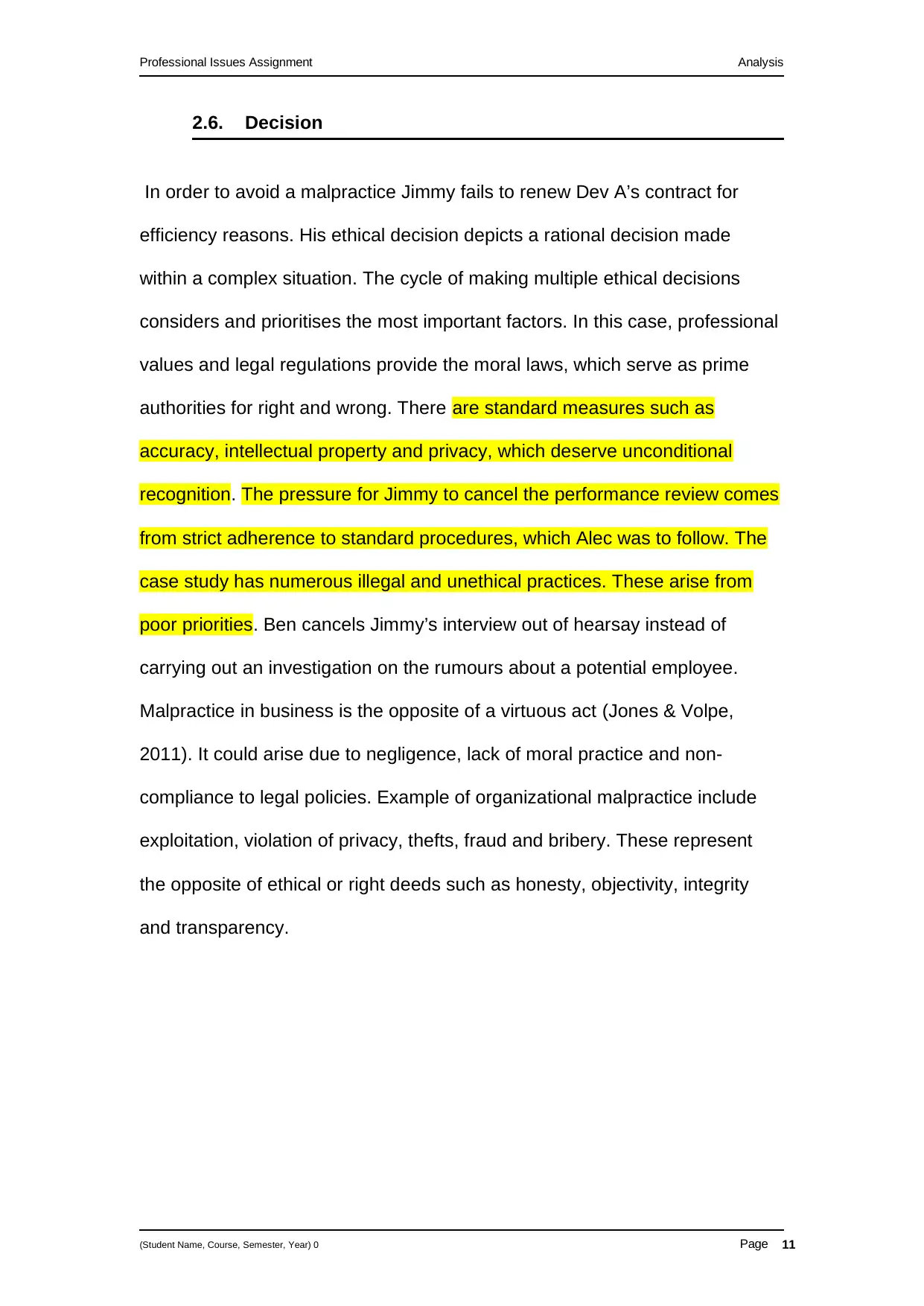
Professional Issues Assignment Analysis
2.6. Decision
In order to avoid a malpractice Jimmy fails to renew Dev A’s contract for
efficiency reasons. His ethical decision depicts a rational decision made
within a complex situation. The cycle of making multiple ethical decisions
considers and prioritises the most important factors. In this case, professional
values and legal regulations provide the moral laws, which serve as prime
authorities for right and wrong. There are standard measures such as
accuracy, intellectual property and privacy, which deserve unconditional
recognition. The pressure for Jimmy to cancel the performance review comes
from strict adherence to standard procedures, which Alec was to follow. The
case study has numerous illegal and unethical practices. These arise from
poor priorities. Ben cancels Jimmy’s interview out of hearsay instead of
carrying out an investigation on the rumours about a potential employee.
Malpractice in business is the opposite of a virtuous act (Jones & Volpe,
2011). It could arise due to negligence, lack of moral practice and non-
compliance to legal policies. Example of organizational malpractice include
exploitation, violation of privacy, thefts, fraud and bribery. These represent
the opposite of ethical or right deeds such as honesty, objectivity, integrity
and transparency.
(Student Name, Course, Semester, Year) 0 Page 11
2.6. Decision
In order to avoid a malpractice Jimmy fails to renew Dev A’s contract for
efficiency reasons. His ethical decision depicts a rational decision made
within a complex situation. The cycle of making multiple ethical decisions
considers and prioritises the most important factors. In this case, professional
values and legal regulations provide the moral laws, which serve as prime
authorities for right and wrong. There are standard measures such as
accuracy, intellectual property and privacy, which deserve unconditional
recognition. The pressure for Jimmy to cancel the performance review comes
from strict adherence to standard procedures, which Alec was to follow. The
case study has numerous illegal and unethical practices. These arise from
poor priorities. Ben cancels Jimmy’s interview out of hearsay instead of
carrying out an investigation on the rumours about a potential employee.
Malpractice in business is the opposite of a virtuous act (Jones & Volpe,
2011). It could arise due to negligence, lack of moral practice and non-
compliance to legal policies. Example of organizational malpractice include
exploitation, violation of privacy, thefts, fraud and bribery. These represent
the opposite of ethical or right deeds such as honesty, objectivity, integrity
and transparency.
(Student Name, Course, Semester, Year) 0 Page 11
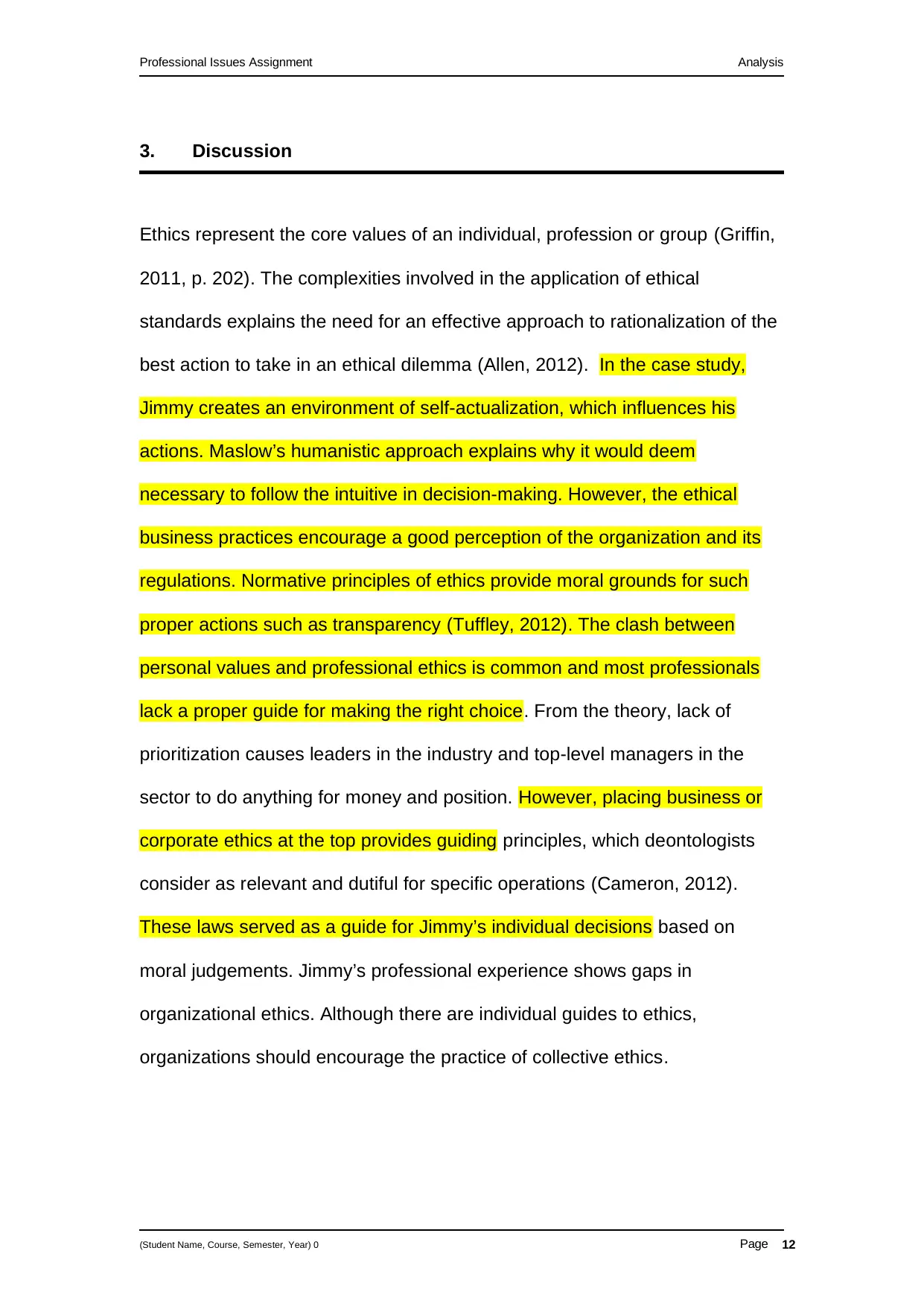
Professional Issues Assignment Analysis
3. Discussion
Ethics represent the core values of an individual, profession or group (Griffin,
2011, p. 202). The complexities involved in the application of ethical
standards explains the need for an effective approach to rationalization of the
best action to take in an ethical dilemma (Allen, 2012). In the case study,
Jimmy creates an environment of self-actualization, which influences his
actions. Maslow’s humanistic approach explains why it would deem
necessary to follow the intuitive in decision-making. However, the ethical
business practices encourage a good perception of the organization and its
regulations. Normative principles of ethics provide moral grounds for such
proper actions such as transparency (Tuffley, 2012). The clash between
personal values and professional ethics is common and most professionals
lack a proper guide for making the right choice. From the theory, lack of
prioritization causes leaders in the industry and top-level managers in the
sector to do anything for money and position. However, placing business or
corporate ethics at the top provides guiding principles, which deontologists
consider as relevant and dutiful for specific operations (Cameron, 2012).
These laws served as a guide for Jimmy’s individual decisions based on
moral judgements. Jimmy’s professional experience shows gaps in
organizational ethics. Although there are individual guides to ethics,
organizations should encourage the practice of collective ethics.
(Student Name, Course, Semester, Year) 0 Page 12
3. Discussion
Ethics represent the core values of an individual, profession or group (Griffin,
2011, p. 202). The complexities involved in the application of ethical
standards explains the need for an effective approach to rationalization of the
best action to take in an ethical dilemma (Allen, 2012). In the case study,
Jimmy creates an environment of self-actualization, which influences his
actions. Maslow’s humanistic approach explains why it would deem
necessary to follow the intuitive in decision-making. However, the ethical
business practices encourage a good perception of the organization and its
regulations. Normative principles of ethics provide moral grounds for such
proper actions such as transparency (Tuffley, 2012). The clash between
personal values and professional ethics is common and most professionals
lack a proper guide for making the right choice. From the theory, lack of
prioritization causes leaders in the industry and top-level managers in the
sector to do anything for money and position. However, placing business or
corporate ethics at the top provides guiding principles, which deontologists
consider as relevant and dutiful for specific operations (Cameron, 2012).
These laws served as a guide for Jimmy’s individual decisions based on
moral judgements. Jimmy’s professional experience shows gaps in
organizational ethics. Although there are individual guides to ethics,
organizations should encourage the practice of collective ethics.
(Student Name, Course, Semester, Year) 0 Page 12
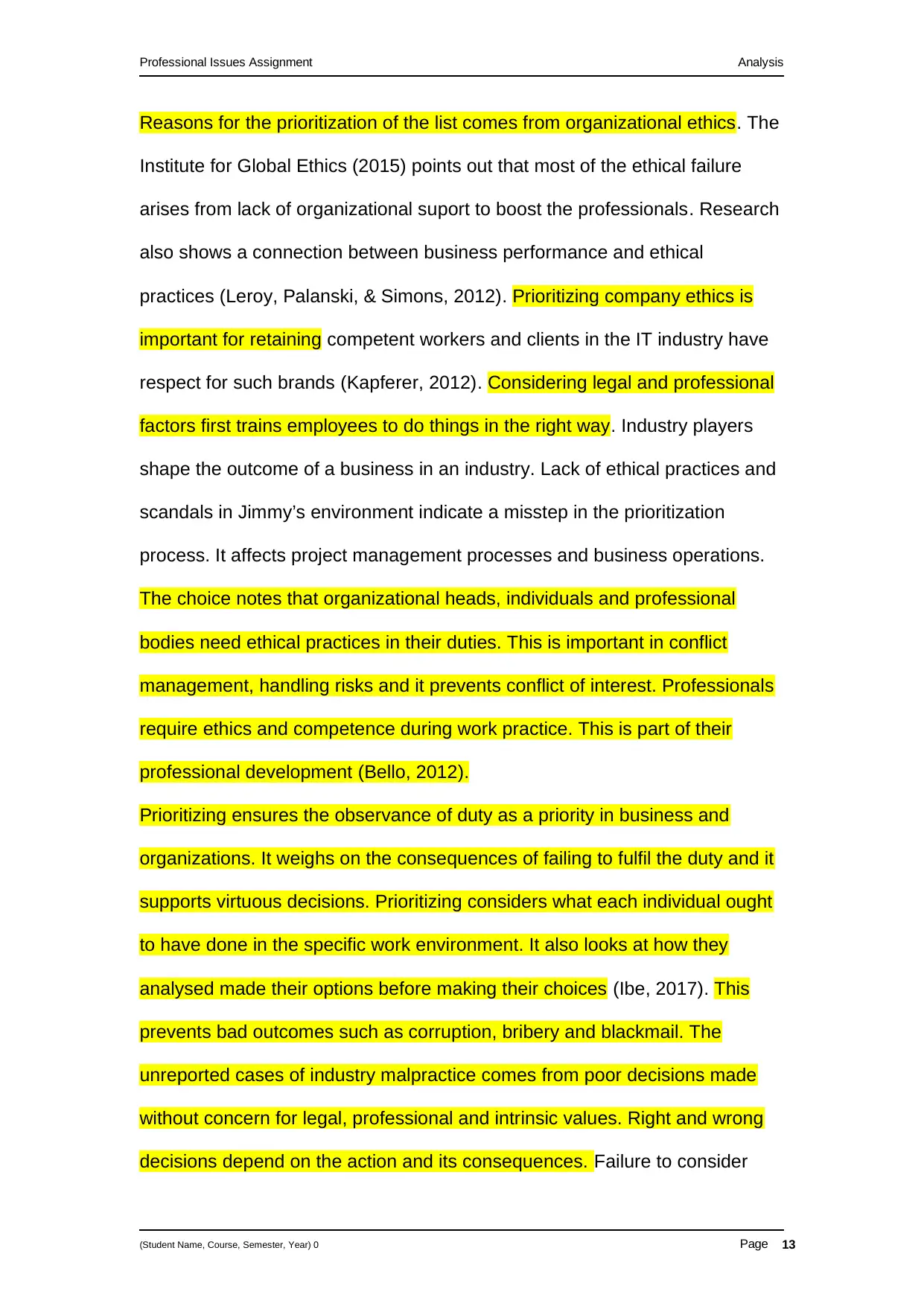
Professional Issues Assignment Analysis
Reasons for the prioritization of the list comes from organizational ethics. The
Institute for Global Ethics (2015) points out that most of the ethical failure
arises from lack of organizational suport to boost the professionals. Research
also shows a connection between business performance and ethical
practices (Leroy, Palanski, & Simons, 2012). Prioritizing company ethics is
important for retaining competent workers and clients in the IT industry have
respect for such brands (Kapferer, 2012). Considering legal and professional
factors first trains employees to do things in the right way. Industry players
shape the outcome of a business in an industry. Lack of ethical practices and
scandals in Jimmy’s environment indicate a misstep in the prioritization
process. It affects project management processes and business operations.
The choice notes that organizational heads, individuals and professional
bodies need ethical practices in their duties. This is important in conflict
management, handling risks and it prevents conflict of interest. Professionals
require ethics and competence during work practice. This is part of their
professional development (Bello, 2012).
Prioritizing ensures the observance of duty as a priority in business and
organizations. It weighs on the consequences of failing to fulfil the duty and it
supports virtuous decisions. Prioritizing considers what each individual ought
to have done in the specific work environment. It also looks at how they
analysed made their options before making their choices (Ibe, 2017). This
prevents bad outcomes such as corruption, bribery and blackmail. The
unreported cases of industry malpractice comes from poor decisions made
without concern for legal, professional and intrinsic values. Right and wrong
decisions depend on the action and its consequences. Failure to consider
(Student Name, Course, Semester, Year) 0 Page 13
Reasons for the prioritization of the list comes from organizational ethics. The
Institute for Global Ethics (2015) points out that most of the ethical failure
arises from lack of organizational suport to boost the professionals. Research
also shows a connection between business performance and ethical
practices (Leroy, Palanski, & Simons, 2012). Prioritizing company ethics is
important for retaining competent workers and clients in the IT industry have
respect for such brands (Kapferer, 2012). Considering legal and professional
factors first trains employees to do things in the right way. Industry players
shape the outcome of a business in an industry. Lack of ethical practices and
scandals in Jimmy’s environment indicate a misstep in the prioritization
process. It affects project management processes and business operations.
The choice notes that organizational heads, individuals and professional
bodies need ethical practices in their duties. This is important in conflict
management, handling risks and it prevents conflict of interest. Professionals
require ethics and competence during work practice. This is part of their
professional development (Bello, 2012).
Prioritizing ensures the observance of duty as a priority in business and
organizations. It weighs on the consequences of failing to fulfil the duty and it
supports virtuous decisions. Prioritizing considers what each individual ought
to have done in the specific work environment. It also looks at how they
analysed made their options before making their choices (Ibe, 2017). This
prevents bad outcomes such as corruption, bribery and blackmail. The
unreported cases of industry malpractice comes from poor decisions made
without concern for legal, professional and intrinsic values. Right and wrong
decisions depend on the action and its consequences. Failure to consider
(Student Name, Course, Semester, Year) 0 Page 13
Paraphrase This Document
Need a fresh take? Get an instant paraphrase of this document with our AI Paraphraser
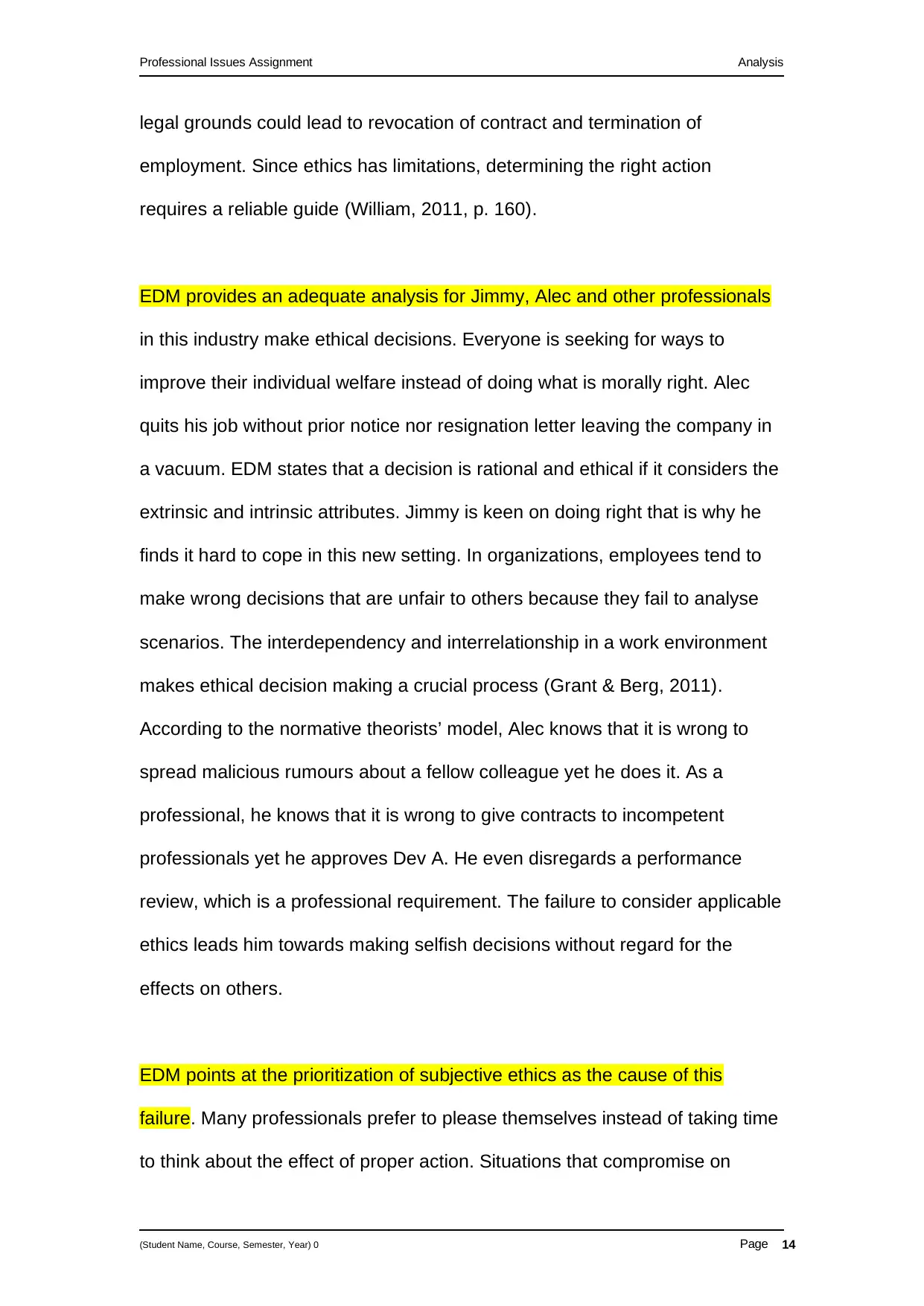
Professional Issues Assignment Analysis
legal grounds could lead to revocation of contract and termination of
employment. Since ethics has limitations, determining the right action
requires a reliable guide (William, 2011, p. 160).
EDM provides an adequate analysis for Jimmy, Alec and other professionals
in this industry make ethical decisions. Everyone is seeking for ways to
improve their individual welfare instead of doing what is morally right. Alec
quits his job without prior notice nor resignation letter leaving the company in
a vacuum. EDM states that a decision is rational and ethical if it considers the
extrinsic and intrinsic attributes. Jimmy is keen on doing right that is why he
finds it hard to cope in this new setting. In organizations, employees tend to
make wrong decisions that are unfair to others because they fail to analyse
scenarios. The interdependency and interrelationship in a work environment
makes ethical decision making a crucial process (Grant & Berg, 2011).
According to the normative theorists’ model, Alec knows that it is wrong to
spread malicious rumours about a fellow colleague yet he does it. As a
professional, he knows that it is wrong to give contracts to incompetent
professionals yet he approves Dev A. He even disregards a performance
review, which is a professional requirement. The failure to consider applicable
ethics leads him towards making selfish decisions without regard for the
effects on others.
EDM points at the prioritization of subjective ethics as the cause of this
failure. Many professionals prefer to please themselves instead of taking time
to think about the effect of proper action. Situations that compromise on
(Student Name, Course, Semester, Year) 0 Page 14
legal grounds could lead to revocation of contract and termination of
employment. Since ethics has limitations, determining the right action
requires a reliable guide (William, 2011, p. 160).
EDM provides an adequate analysis for Jimmy, Alec and other professionals
in this industry make ethical decisions. Everyone is seeking for ways to
improve their individual welfare instead of doing what is morally right. Alec
quits his job without prior notice nor resignation letter leaving the company in
a vacuum. EDM states that a decision is rational and ethical if it considers the
extrinsic and intrinsic attributes. Jimmy is keen on doing right that is why he
finds it hard to cope in this new setting. In organizations, employees tend to
make wrong decisions that are unfair to others because they fail to analyse
scenarios. The interdependency and interrelationship in a work environment
makes ethical decision making a crucial process (Grant & Berg, 2011).
According to the normative theorists’ model, Alec knows that it is wrong to
spread malicious rumours about a fellow colleague yet he does it. As a
professional, he knows that it is wrong to give contracts to incompetent
professionals yet he approves Dev A. He even disregards a performance
review, which is a professional requirement. The failure to consider applicable
ethics leads him towards making selfish decisions without regard for the
effects on others.
EDM points at the prioritization of subjective ethics as the cause of this
failure. Many professionals prefer to please themselves instead of taking time
to think about the effect of proper action. Situations that compromise on
(Student Name, Course, Semester, Year) 0 Page 14
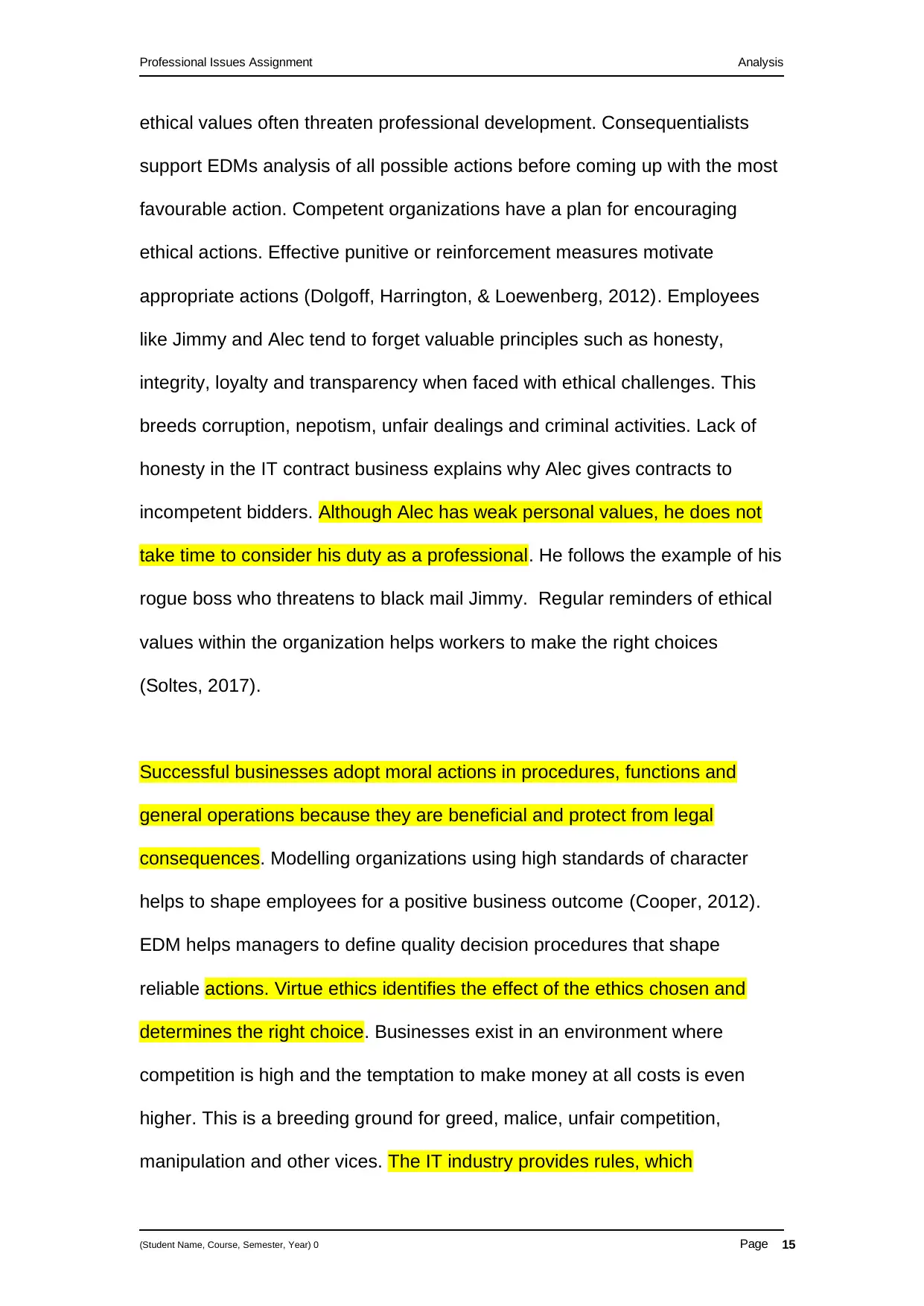
Professional Issues Assignment Analysis
ethical values often threaten professional development. Consequentialists
support EDMs analysis of all possible actions before coming up with the most
favourable action. Competent organizations have a plan for encouraging
ethical actions. Effective punitive or reinforcement measures motivate
appropriate actions (Dolgoff, Harrington, & Loewenberg, 2012). Employees
like Jimmy and Alec tend to forget valuable principles such as honesty,
integrity, loyalty and transparency when faced with ethical challenges. This
breeds corruption, nepotism, unfair dealings and criminal activities. Lack of
honesty in the IT contract business explains why Alec gives contracts to
incompetent bidders. Although Alec has weak personal values, he does not
take time to consider his duty as a professional. He follows the example of his
rogue boss who threatens to black mail Jimmy. Regular reminders of ethical
values within the organization helps workers to make the right choices
(Soltes, 2017).
Successful businesses adopt moral actions in procedures, functions and
general operations because they are beneficial and protect from legal
consequences. Modelling organizations using high standards of character
helps to shape employees for a positive business outcome (Cooper, 2012).
EDM helps managers to define quality decision procedures that shape
reliable actions. Virtue ethics identifies the effect of the ethics chosen and
determines the right choice. Businesses exist in an environment where
competition is high and the temptation to make money at all costs is even
higher. This is a breeding ground for greed, malice, unfair competition,
manipulation and other vices. The IT industry provides rules, which
(Student Name, Course, Semester, Year) 0 Page 15
ethical values often threaten professional development. Consequentialists
support EDMs analysis of all possible actions before coming up with the most
favourable action. Competent organizations have a plan for encouraging
ethical actions. Effective punitive or reinforcement measures motivate
appropriate actions (Dolgoff, Harrington, & Loewenberg, 2012). Employees
like Jimmy and Alec tend to forget valuable principles such as honesty,
integrity, loyalty and transparency when faced with ethical challenges. This
breeds corruption, nepotism, unfair dealings and criminal activities. Lack of
honesty in the IT contract business explains why Alec gives contracts to
incompetent bidders. Although Alec has weak personal values, he does not
take time to consider his duty as a professional. He follows the example of his
rogue boss who threatens to black mail Jimmy. Regular reminders of ethical
values within the organization helps workers to make the right choices
(Soltes, 2017).
Successful businesses adopt moral actions in procedures, functions and
general operations because they are beneficial and protect from legal
consequences. Modelling organizations using high standards of character
helps to shape employees for a positive business outcome (Cooper, 2012).
EDM helps managers to define quality decision procedures that shape
reliable actions. Virtue ethics identifies the effect of the ethics chosen and
determines the right choice. Businesses exist in an environment where
competition is high and the temptation to make money at all costs is even
higher. This is a breeding ground for greed, malice, unfair competition,
manipulation and other vices. The IT industry provides rules, which
(Student Name, Course, Semester, Year) 0 Page 15
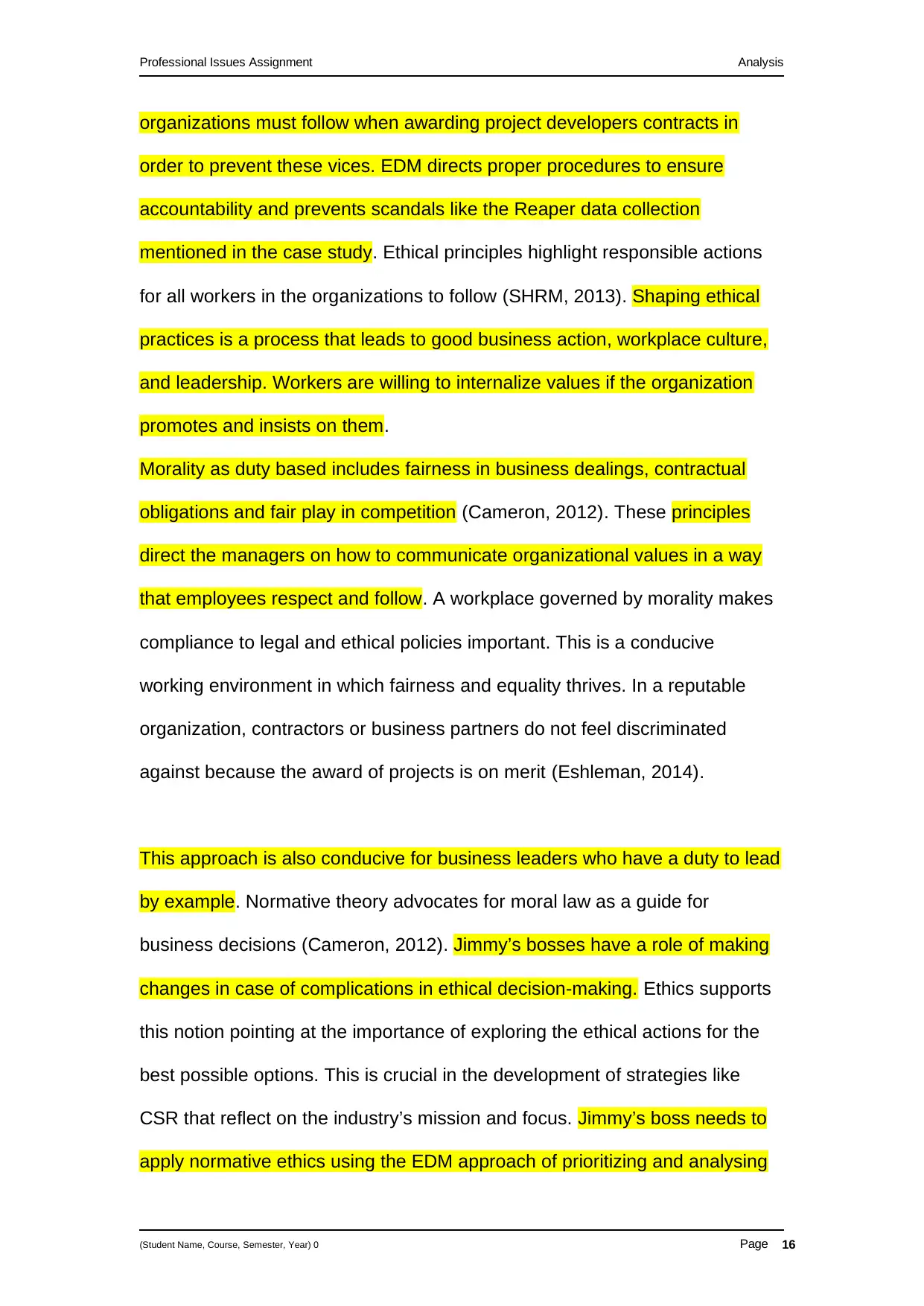
Professional Issues Assignment Analysis
organizations must follow when awarding project developers contracts in
order to prevent these vices. EDM directs proper procedures to ensure
accountability and prevents scandals like the Reaper data collection
mentioned in the case study. Ethical principles highlight responsible actions
for all workers in the organizations to follow (SHRM, 2013). Shaping ethical
practices is a process that leads to good business action, workplace culture,
and leadership. Workers are willing to internalize values if the organization
promotes and insists on them.
Morality as duty based includes fairness in business dealings, contractual
obligations and fair play in competition (Cameron, 2012). These principles
direct the managers on how to communicate organizational values in a way
that employees respect and follow. A workplace governed by morality makes
compliance to legal and ethical policies important. This is a conducive
working environment in which fairness and equality thrives. In a reputable
organization, contractors or business partners do not feel discriminated
against because the award of projects is on merit (Eshleman, 2014).
This approach is also conducive for business leaders who have a duty to lead
by example. Normative theory advocates for moral law as a guide for
business decisions (Cameron, 2012). Jimmy’s bosses have a role of making
changes in case of complications in ethical decision-making. Ethics supports
this notion pointing at the importance of exploring the ethical actions for the
best possible options. This is crucial in the development of strategies like
CSR that reflect on the industry’s mission and focus. Jimmy’s boss needs to
apply normative ethics using the EDM approach of prioritizing and analysing
(Student Name, Course, Semester, Year) 0 Page 16
organizations must follow when awarding project developers contracts in
order to prevent these vices. EDM directs proper procedures to ensure
accountability and prevents scandals like the Reaper data collection
mentioned in the case study. Ethical principles highlight responsible actions
for all workers in the organizations to follow (SHRM, 2013). Shaping ethical
practices is a process that leads to good business action, workplace culture,
and leadership. Workers are willing to internalize values if the organization
promotes and insists on them.
Morality as duty based includes fairness in business dealings, contractual
obligations and fair play in competition (Cameron, 2012). These principles
direct the managers on how to communicate organizational values in a way
that employees respect and follow. A workplace governed by morality makes
compliance to legal and ethical policies important. This is a conducive
working environment in which fairness and equality thrives. In a reputable
organization, contractors or business partners do not feel discriminated
against because the award of projects is on merit (Eshleman, 2014).
This approach is also conducive for business leaders who have a duty to lead
by example. Normative theory advocates for moral law as a guide for
business decisions (Cameron, 2012). Jimmy’s bosses have a role of making
changes in case of complications in ethical decision-making. Ethics supports
this notion pointing at the importance of exploring the ethical actions for the
best possible options. This is crucial in the development of strategies like
CSR that reflect on the industry’s mission and focus. Jimmy’s boss needs to
apply normative ethics using the EDM approach of prioritizing and analysing
(Student Name, Course, Semester, Year) 0 Page 16
Secure Best Marks with AI Grader
Need help grading? Try our AI Grader for instant feedback on your assignments.
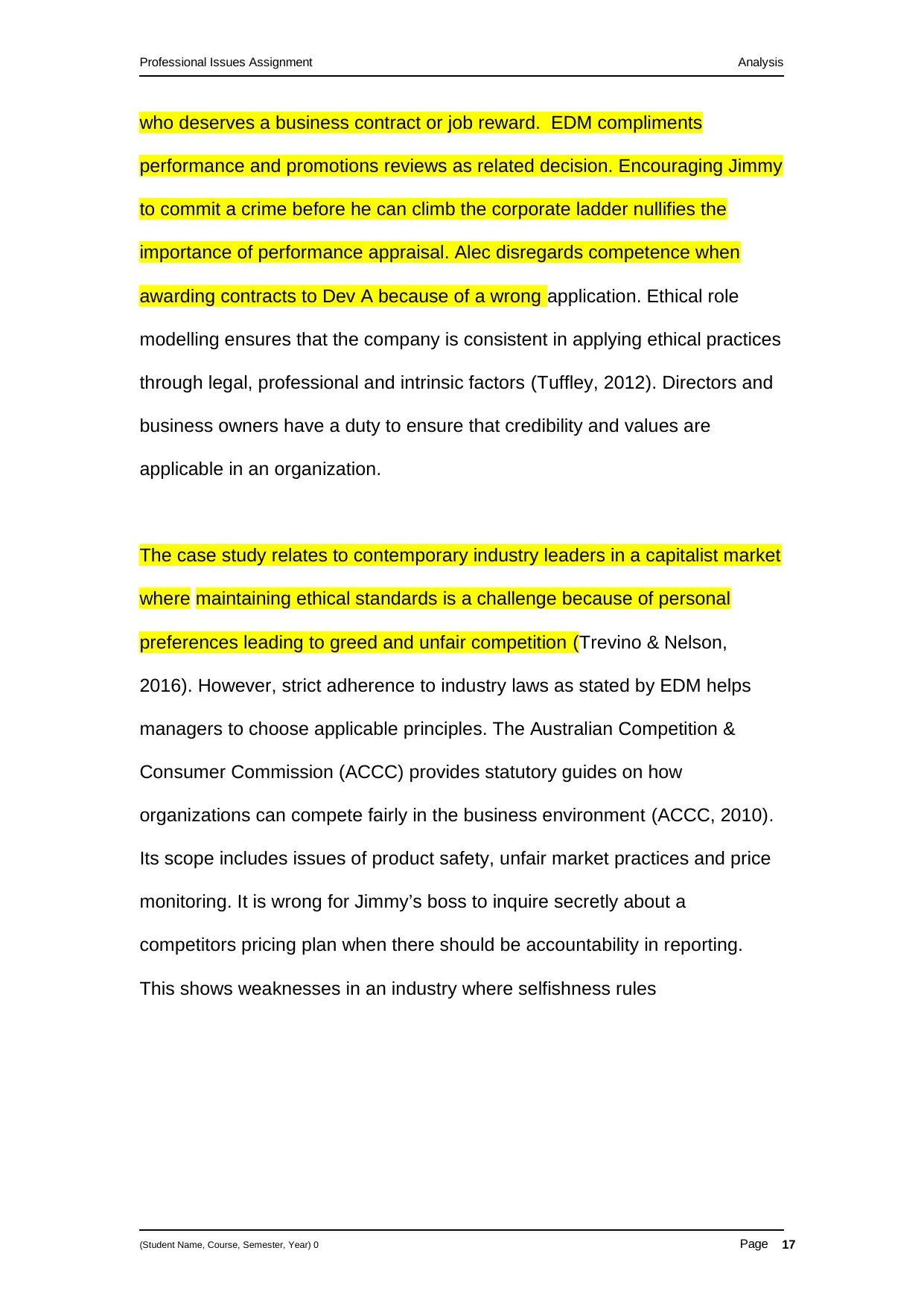
Professional Issues Assignment Analysis
who deserves a business contract or job reward. EDM compliments
performance and promotions reviews as related decision. Encouraging Jimmy
to commit a crime before he can climb the corporate ladder nullifies the
importance of performance appraisal. Alec disregards competence when
awarding contracts to Dev A because of a wrong application. Ethical role
modelling ensures that the company is consistent in applying ethical practices
through legal, professional and intrinsic factors (Tuffley, 2012). Directors and
business owners have a duty to ensure that credibility and values are
applicable in an organization.
The case study relates to contemporary industry leaders in a capitalist market
where maintaining ethical standards is a challenge because of personal
preferences leading to greed and unfair competition (Trevino & Nelson,
2016). However, strict adherence to industry laws as stated by EDM helps
managers to choose applicable principles. The Australian Competition &
Consumer Commission (ACCC) provides statutory guides on how
organizations can compete fairly in the business environment (ACCC, 2010).
Its scope includes issues of product safety, unfair market practices and price
monitoring. It is wrong for Jimmy’s boss to inquire secretly about a
competitors pricing plan when there should be accountability in reporting.
This shows weaknesses in an industry where selfishness rules
(Student Name, Course, Semester, Year) 0 Page 17
who deserves a business contract or job reward. EDM compliments
performance and promotions reviews as related decision. Encouraging Jimmy
to commit a crime before he can climb the corporate ladder nullifies the
importance of performance appraisal. Alec disregards competence when
awarding contracts to Dev A because of a wrong application. Ethical role
modelling ensures that the company is consistent in applying ethical practices
through legal, professional and intrinsic factors (Tuffley, 2012). Directors and
business owners have a duty to ensure that credibility and values are
applicable in an organization.
The case study relates to contemporary industry leaders in a capitalist market
where maintaining ethical standards is a challenge because of personal
preferences leading to greed and unfair competition (Trevino & Nelson,
2016). However, strict adherence to industry laws as stated by EDM helps
managers to choose applicable principles. The Australian Competition &
Consumer Commission (ACCC) provides statutory guides on how
organizations can compete fairly in the business environment (ACCC, 2010).
Its scope includes issues of product safety, unfair market practices and price
monitoring. It is wrong for Jimmy’s boss to inquire secretly about a
competitors pricing plan when there should be accountability in reporting.
This shows weaknesses in an industry where selfishness rules
(Student Name, Course, Semester, Year) 0 Page 17
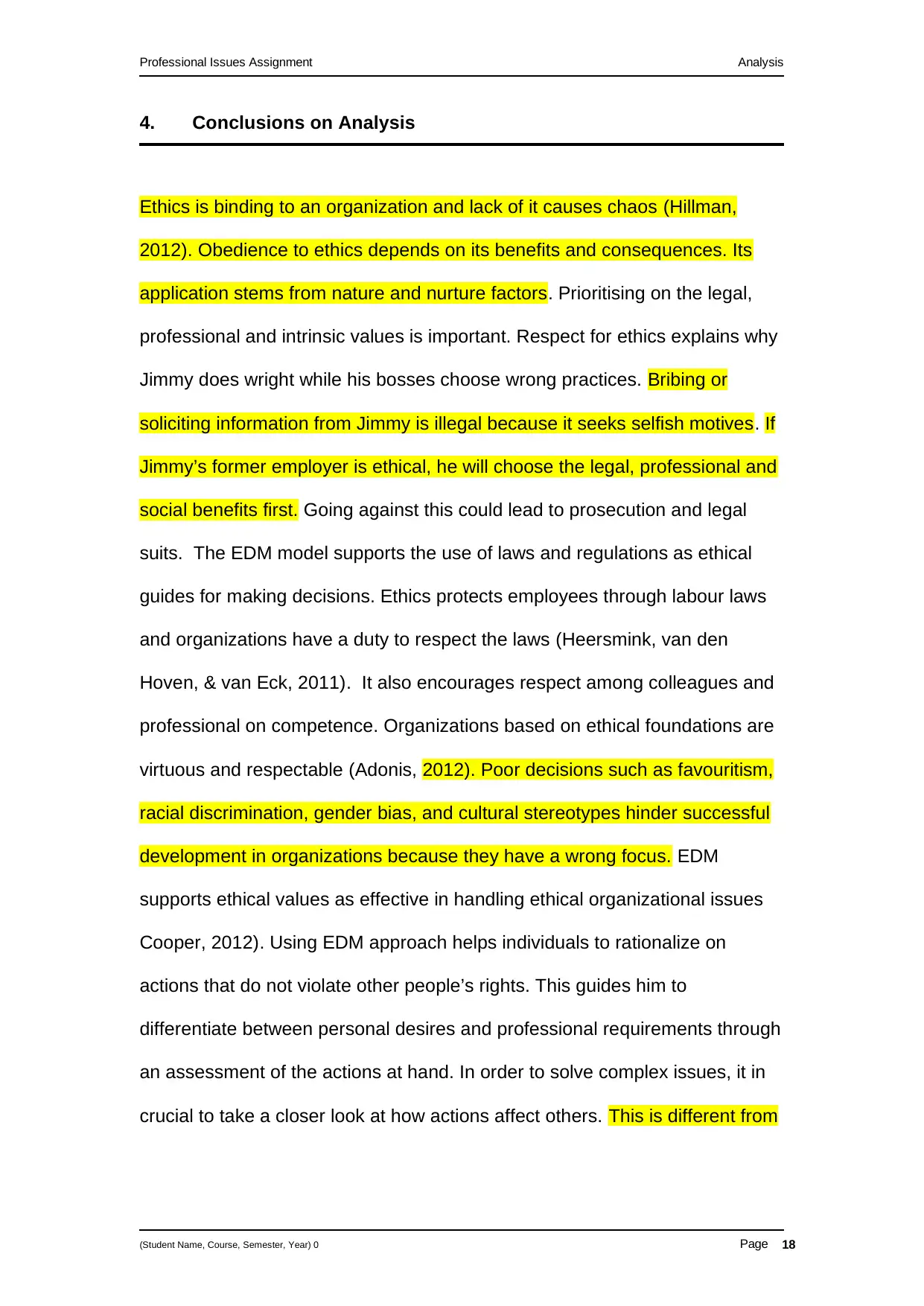
Professional Issues Assignment Analysis
4. Conclusions on Analysis
Ethics is binding to an organization and lack of it causes chaos (Hillman,
2012). Obedience to ethics depends on its benefits and consequences. Its
application stems from nature and nurture factors. Prioritising on the legal,
professional and intrinsic values is important. Respect for ethics explains why
Jimmy does wright while his bosses choose wrong practices. Bribing or
soliciting information from Jimmy is illegal because it seeks selfish motives. If
Jimmy’s former employer is ethical, he will choose the legal, professional and
social benefits first. Going against this could lead to prosecution and legal
suits. The EDM model supports the use of laws and regulations as ethical
guides for making decisions. Ethics protects employees through labour laws
and organizations have a duty to respect the laws (Heersmink, van den
Hoven, & van Eck, 2011). It also encourages respect among colleagues and
professional on competence. Organizations based on ethical foundations are
virtuous and respectable (Adonis, 2012). Poor decisions such as favouritism,
racial discrimination, gender bias, and cultural stereotypes hinder successful
development in organizations because they have a wrong focus. EDM
supports ethical values as effective in handling ethical organizational issues
Cooper, 2012). Using EDM approach helps individuals to rationalize on
actions that do not violate other people’s rights. This guides him to
differentiate between personal desires and professional requirements through
an assessment of the actions at hand. In order to solve complex issues, it in
crucial to take a closer look at how actions affect others. This is different from
(Student Name, Course, Semester, Year) 0 Page 18
4. Conclusions on Analysis
Ethics is binding to an organization and lack of it causes chaos (Hillman,
2012). Obedience to ethics depends on its benefits and consequences. Its
application stems from nature and nurture factors. Prioritising on the legal,
professional and intrinsic values is important. Respect for ethics explains why
Jimmy does wright while his bosses choose wrong practices. Bribing or
soliciting information from Jimmy is illegal because it seeks selfish motives. If
Jimmy’s former employer is ethical, he will choose the legal, professional and
social benefits first. Going against this could lead to prosecution and legal
suits. The EDM model supports the use of laws and regulations as ethical
guides for making decisions. Ethics protects employees through labour laws
and organizations have a duty to respect the laws (Heersmink, van den
Hoven, & van Eck, 2011). It also encourages respect among colleagues and
professional on competence. Organizations based on ethical foundations are
virtuous and respectable (Adonis, 2012). Poor decisions such as favouritism,
racial discrimination, gender bias, and cultural stereotypes hinder successful
development in organizations because they have a wrong focus. EDM
supports ethical values as effective in handling ethical organizational issues
Cooper, 2012). Using EDM approach helps individuals to rationalize on
actions that do not violate other people’s rights. This guides him to
differentiate between personal desires and professional requirements through
an assessment of the actions at hand. In order to solve complex issues, it in
crucial to take a closer look at how actions affect others. This is different from
(Student Name, Course, Semester, Year) 0 Page 18
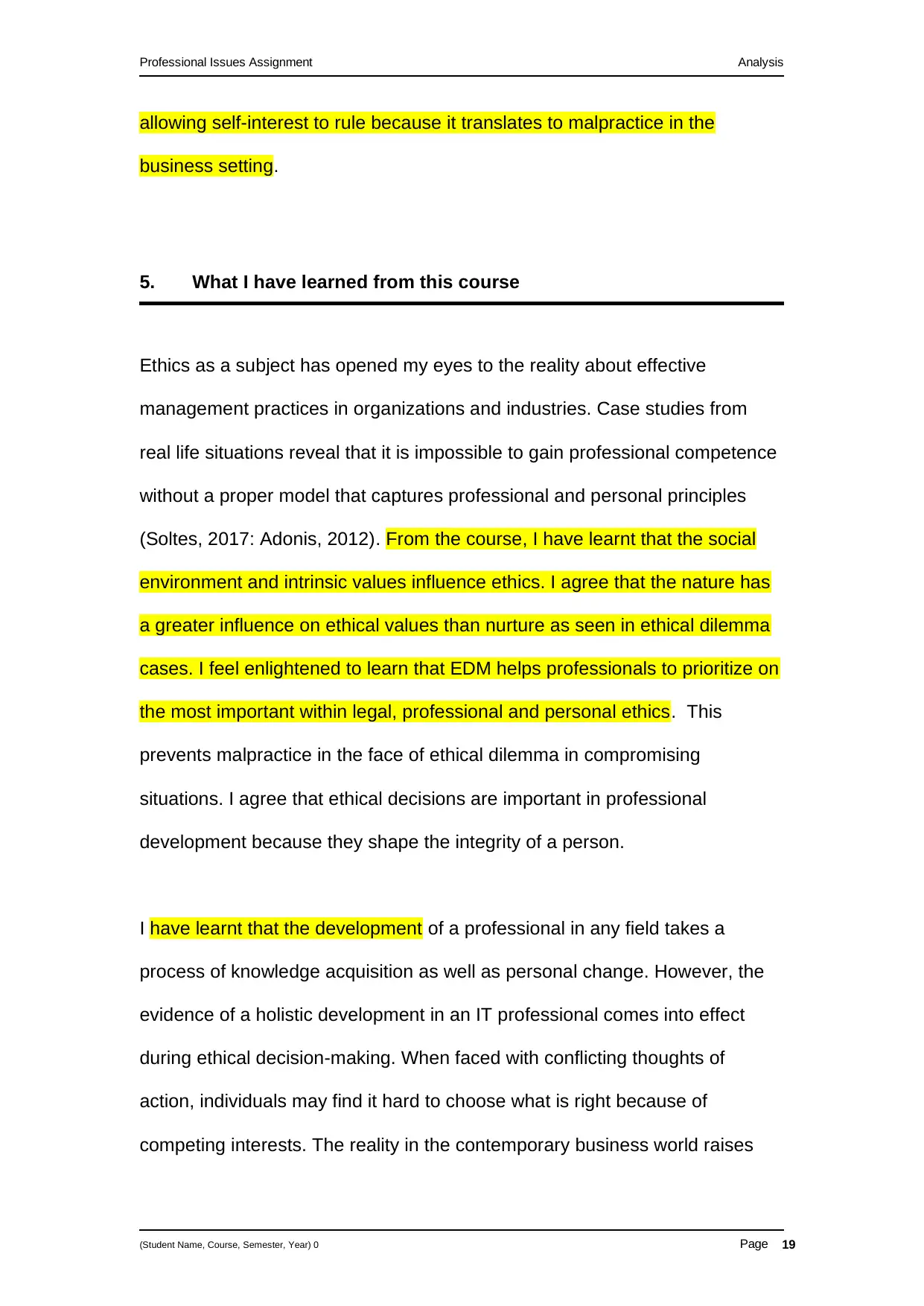
Professional Issues Assignment Analysis
allowing self-interest to rule because it translates to malpractice in the
business setting.
5. What I have learned from this course
Ethics as a subject has opened my eyes to the reality about effective
management practices in organizations and industries. Case studies from
real life situations reveal that it is impossible to gain professional competence
without a proper model that captures professional and personal principles
(Soltes, 2017: Adonis, 2012). From the course, I have learnt that the social
environment and intrinsic values influence ethics. I agree that the nature has
a greater influence on ethical values than nurture as seen in ethical dilemma
cases. I feel enlightened to learn that EDM helps professionals to prioritize on
the most important within legal, professional and personal ethics. This
prevents malpractice in the face of ethical dilemma in compromising
situations. I agree that ethical decisions are important in professional
development because they shape the integrity of a person.
I have learnt that the development of a professional in any field takes a
process of knowledge acquisition as well as personal change. However, the
evidence of a holistic development in an IT professional comes into effect
during ethical decision-making. When faced with conflicting thoughts of
action, individuals may find it hard to choose what is right because of
competing interests. The reality in the contemporary business world raises
(Student Name, Course, Semester, Year) 0 Page 19
allowing self-interest to rule because it translates to malpractice in the
business setting.
5. What I have learned from this course
Ethics as a subject has opened my eyes to the reality about effective
management practices in organizations and industries. Case studies from
real life situations reveal that it is impossible to gain professional competence
without a proper model that captures professional and personal principles
(Soltes, 2017: Adonis, 2012). From the course, I have learnt that the social
environment and intrinsic values influence ethics. I agree that the nature has
a greater influence on ethical values than nurture as seen in ethical dilemma
cases. I feel enlightened to learn that EDM helps professionals to prioritize on
the most important within legal, professional and personal ethics. This
prevents malpractice in the face of ethical dilemma in compromising
situations. I agree that ethical decisions are important in professional
development because they shape the integrity of a person.
I have learnt that the development of a professional in any field takes a
process of knowledge acquisition as well as personal change. However, the
evidence of a holistic development in an IT professional comes into effect
during ethical decision-making. When faced with conflicting thoughts of
action, individuals may find it hard to choose what is right because of
competing interests. The reality in the contemporary business world raises
(Student Name, Course, Semester, Year) 0 Page 19
Paraphrase This Document
Need a fresh take? Get an instant paraphrase of this document with our AI Paraphraser
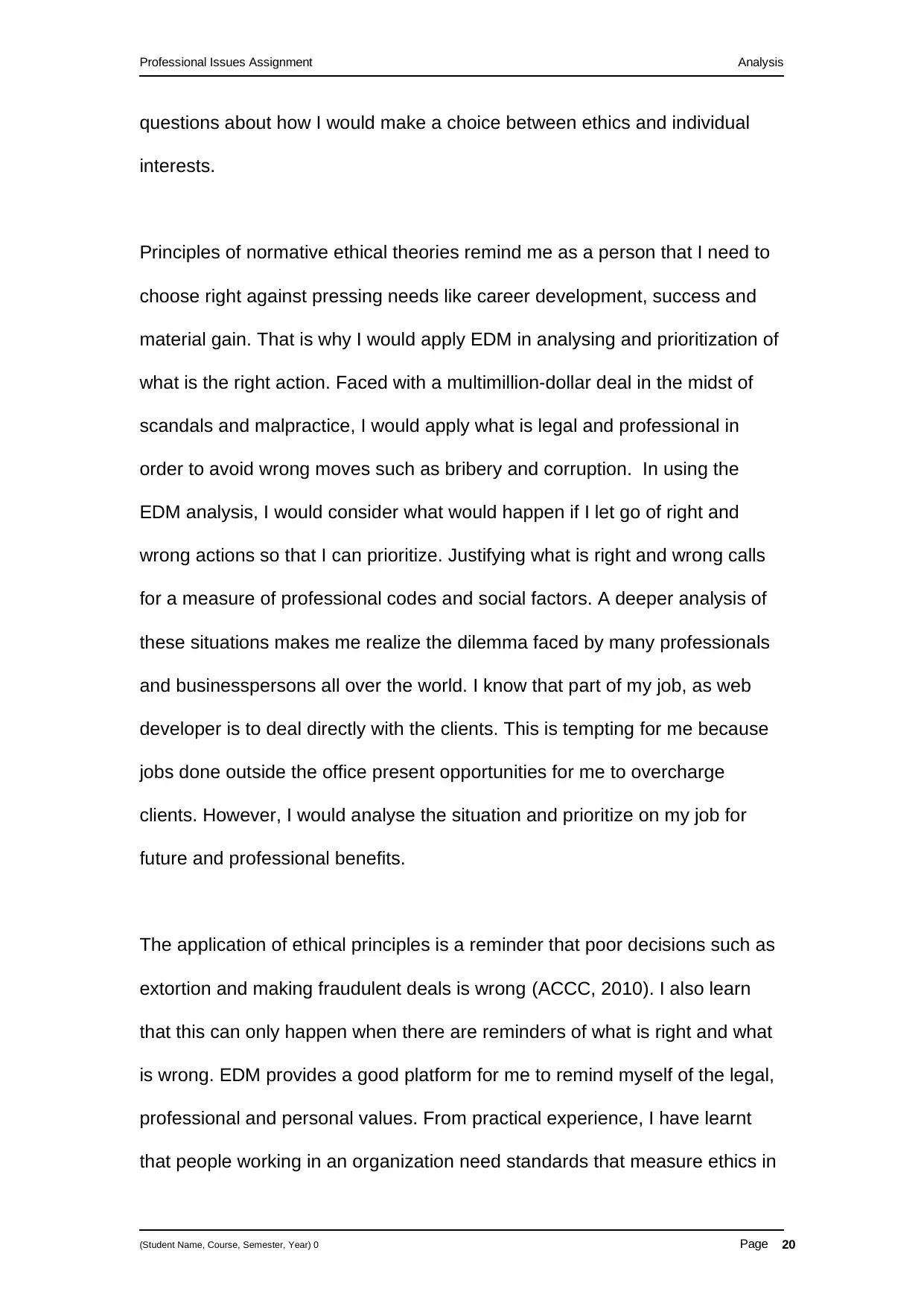
Professional Issues Assignment Analysis
questions about how I would make a choice between ethics and individual
interests.
Principles of normative ethical theories remind me as a person that I need to
choose right against pressing needs like career development, success and
material gain. That is why I would apply EDM in analysing and prioritization of
what is the right action. Faced with a multimillion-dollar deal in the midst of
scandals and malpractice, I would apply what is legal and professional in
order to avoid wrong moves such as bribery and corruption. In using the
EDM analysis, I would consider what would happen if I let go of right and
wrong actions so that I can prioritize. Justifying what is right and wrong calls
for a measure of professional codes and social factors. A deeper analysis of
these situations makes me realize the dilemma faced by many professionals
and businesspersons all over the world. I know that part of my job, as web
developer is to deal directly with the clients. This is tempting for me because
jobs done outside the office present opportunities for me to overcharge
clients. However, I would analyse the situation and prioritize on my job for
future and professional benefits.
The application of ethical principles is a reminder that poor decisions such as
extortion and making fraudulent deals is wrong (ACCC, 2010). I also learn
that this can only happen when there are reminders of what is right and what
is wrong. EDM provides a good platform for me to remind myself of the legal,
professional and personal values. From practical experience, I have learnt
that people working in an organization need standards that measure ethics in
(Student Name, Course, Semester, Year) 0 Page 20
questions about how I would make a choice between ethics and individual
interests.
Principles of normative ethical theories remind me as a person that I need to
choose right against pressing needs like career development, success and
material gain. That is why I would apply EDM in analysing and prioritization of
what is the right action. Faced with a multimillion-dollar deal in the midst of
scandals and malpractice, I would apply what is legal and professional in
order to avoid wrong moves such as bribery and corruption. In using the
EDM analysis, I would consider what would happen if I let go of right and
wrong actions so that I can prioritize. Justifying what is right and wrong calls
for a measure of professional codes and social factors. A deeper analysis of
these situations makes me realize the dilemma faced by many professionals
and businesspersons all over the world. I know that part of my job, as web
developer is to deal directly with the clients. This is tempting for me because
jobs done outside the office present opportunities for me to overcharge
clients. However, I would analyse the situation and prioritize on my job for
future and professional benefits.
The application of ethical principles is a reminder that poor decisions such as
extortion and making fraudulent deals is wrong (ACCC, 2010). I also learn
that this can only happen when there are reminders of what is right and what
is wrong. EDM provides a good platform for me to remind myself of the legal,
professional and personal values. From practical experience, I have learnt
that people working in an organization need standards that measure ethics in
(Student Name, Course, Semester, Year) 0 Page 20
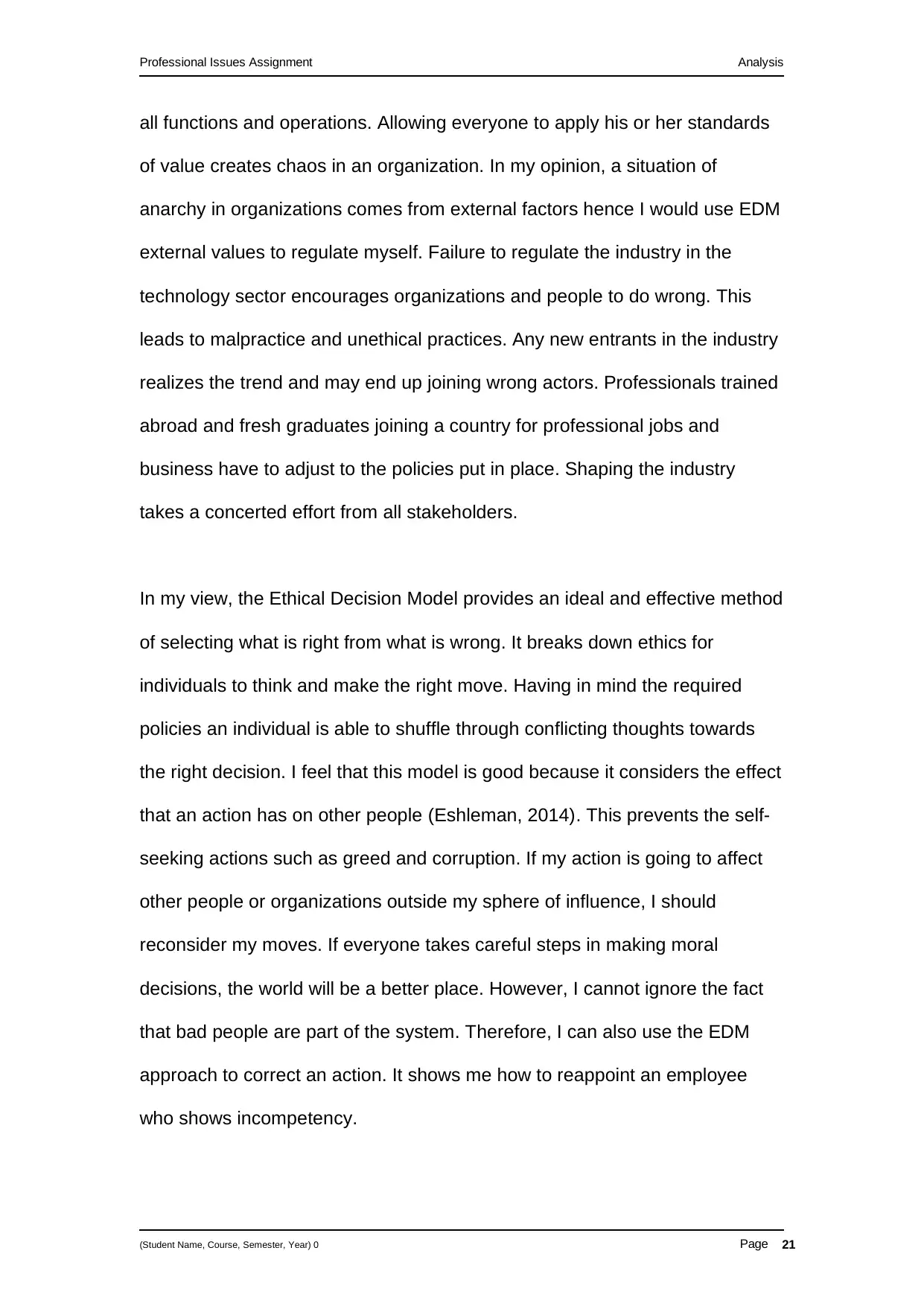
Professional Issues Assignment Analysis
all functions and operations. Allowing everyone to apply his or her standards
of value creates chaos in an organization. In my opinion, a situation of
anarchy in organizations comes from external factors hence I would use EDM
external values to regulate myself. Failure to regulate the industry in the
technology sector encourages organizations and people to do wrong. This
leads to malpractice and unethical practices. Any new entrants in the industry
realizes the trend and may end up joining wrong actors. Professionals trained
abroad and fresh graduates joining a country for professional jobs and
business have to adjust to the policies put in place. Shaping the industry
takes a concerted effort from all stakeholders.
In my view, the Ethical Decision Model provides an ideal and effective method
of selecting what is right from what is wrong. It breaks down ethics for
individuals to think and make the right move. Having in mind the required
policies an individual is able to shuffle through conflicting thoughts towards
the right decision. I feel that this model is good because it considers the effect
that an action has on other people (Eshleman, 2014). This prevents the self-
seeking actions such as greed and corruption. If my action is going to affect
other people or organizations outside my sphere of influence, I should
reconsider my moves. If everyone takes careful steps in making moral
decisions, the world will be a better place. However, I cannot ignore the fact
that bad people are part of the system. Therefore, I can also use the EDM
approach to correct an action. It shows me how to reappoint an employee
who shows incompetency.
(Student Name, Course, Semester, Year) 0 Page 21
all functions and operations. Allowing everyone to apply his or her standards
of value creates chaos in an organization. In my opinion, a situation of
anarchy in organizations comes from external factors hence I would use EDM
external values to regulate myself. Failure to regulate the industry in the
technology sector encourages organizations and people to do wrong. This
leads to malpractice and unethical practices. Any new entrants in the industry
realizes the trend and may end up joining wrong actors. Professionals trained
abroad and fresh graduates joining a country for professional jobs and
business have to adjust to the policies put in place. Shaping the industry
takes a concerted effort from all stakeholders.
In my view, the Ethical Decision Model provides an ideal and effective method
of selecting what is right from what is wrong. It breaks down ethics for
individuals to think and make the right move. Having in mind the required
policies an individual is able to shuffle through conflicting thoughts towards
the right decision. I feel that this model is good because it considers the effect
that an action has on other people (Eshleman, 2014). This prevents the self-
seeking actions such as greed and corruption. If my action is going to affect
other people or organizations outside my sphere of influence, I should
reconsider my moves. If everyone takes careful steps in making moral
decisions, the world will be a better place. However, I cannot ignore the fact
that bad people are part of the system. Therefore, I can also use the EDM
approach to correct an action. It shows me how to reappoint an employee
who shows incompetency.
(Student Name, Course, Semester, Year) 0 Page 21
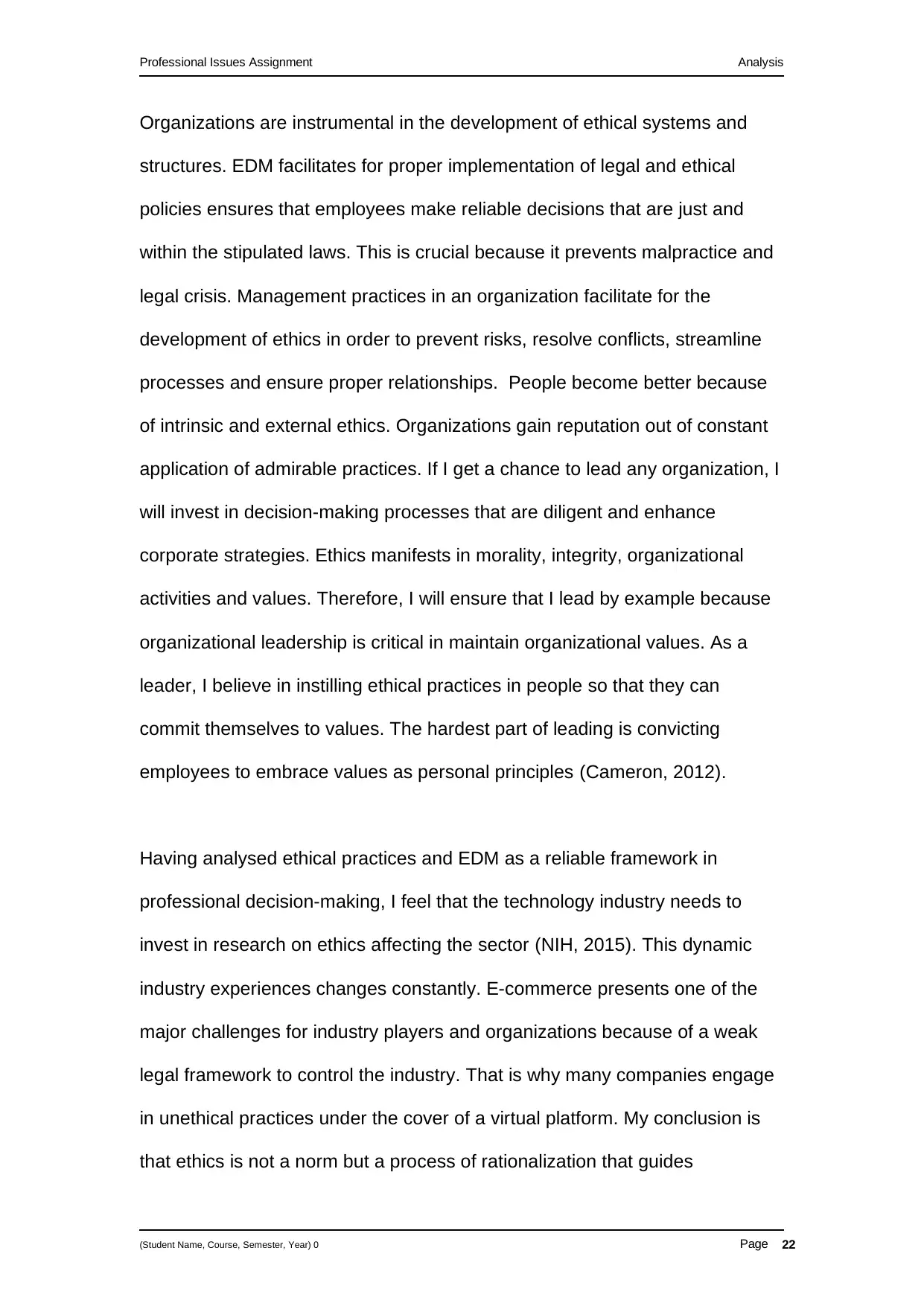
Professional Issues Assignment Analysis
Organizations are instrumental in the development of ethical systems and
structures. EDM facilitates for proper implementation of legal and ethical
policies ensures that employees make reliable decisions that are just and
within the stipulated laws. This is crucial because it prevents malpractice and
legal crisis. Management practices in an organization facilitate for the
development of ethics in order to prevent risks, resolve conflicts, streamline
processes and ensure proper relationships. People become better because
of intrinsic and external ethics. Organizations gain reputation out of constant
application of admirable practices. If I get a chance to lead any organization, I
will invest in decision-making processes that are diligent and enhance
corporate strategies. Ethics manifests in morality, integrity, organizational
activities and values. Therefore, I will ensure that I lead by example because
organizational leadership is critical in maintain organizational values. As a
leader, I believe in instilling ethical practices in people so that they can
commit themselves to values. The hardest part of leading is convicting
employees to embrace values as personal principles (Cameron, 2012).
Having analysed ethical practices and EDM as a reliable framework in
professional decision-making, I feel that the technology industry needs to
invest in research on ethics affecting the sector (NIH, 2015). This dynamic
industry experiences changes constantly. E-commerce presents one of the
major challenges for industry players and organizations because of a weak
legal framework to control the industry. That is why many companies engage
in unethical practices under the cover of a virtual platform. My conclusion is
that ethics is not a norm but a process of rationalization that guides
(Student Name, Course, Semester, Year) 0 Page 22
Organizations are instrumental in the development of ethical systems and
structures. EDM facilitates for proper implementation of legal and ethical
policies ensures that employees make reliable decisions that are just and
within the stipulated laws. This is crucial because it prevents malpractice and
legal crisis. Management practices in an organization facilitate for the
development of ethics in order to prevent risks, resolve conflicts, streamline
processes and ensure proper relationships. People become better because
of intrinsic and external ethics. Organizations gain reputation out of constant
application of admirable practices. If I get a chance to lead any organization, I
will invest in decision-making processes that are diligent and enhance
corporate strategies. Ethics manifests in morality, integrity, organizational
activities and values. Therefore, I will ensure that I lead by example because
organizational leadership is critical in maintain organizational values. As a
leader, I believe in instilling ethical practices in people so that they can
commit themselves to values. The hardest part of leading is convicting
employees to embrace values as personal principles (Cameron, 2012).
Having analysed ethical practices and EDM as a reliable framework in
professional decision-making, I feel that the technology industry needs to
invest in research on ethics affecting the sector (NIH, 2015). This dynamic
industry experiences changes constantly. E-commerce presents one of the
major challenges for industry players and organizations because of a weak
legal framework to control the industry. That is why many companies engage
in unethical practices under the cover of a virtual platform. My conclusion is
that ethics is not a norm but a process of rationalization that guides
(Student Name, Course, Semester, Year) 0 Page 22
Secure Best Marks with AI Grader
Need help grading? Try our AI Grader for instant feedback on your assignments.
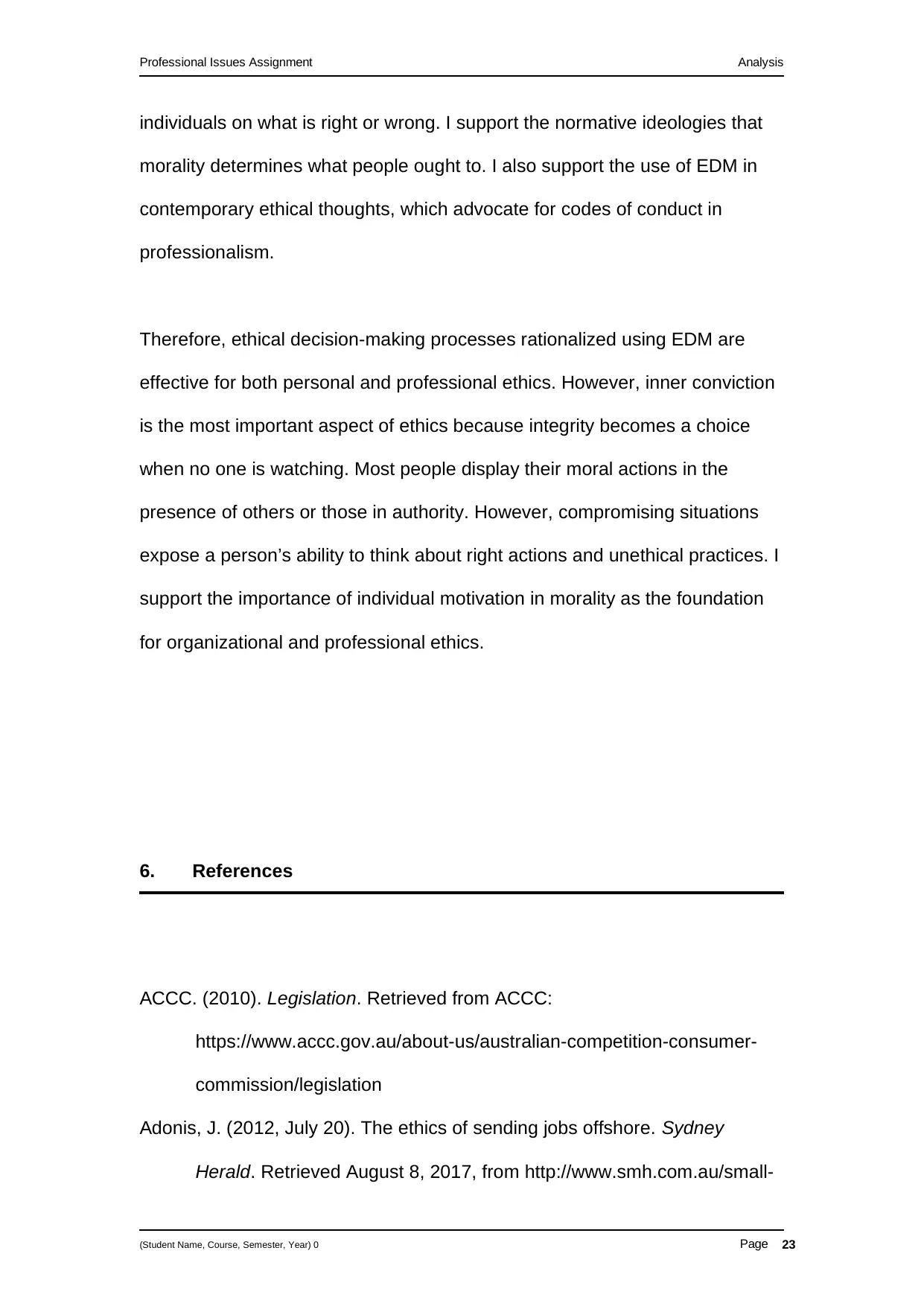
Professional Issues Assignment Analysis
individuals on what is right or wrong. I support the normative ideologies that
morality determines what people ought to. I also support the use of EDM in
contemporary ethical thoughts, which advocate for codes of conduct in
professionalism.
Therefore, ethical decision-making processes rationalized using EDM are
effective for both personal and professional ethics. However, inner conviction
is the most important aspect of ethics because integrity becomes a choice
when no one is watching. Most people display their moral actions in the
presence of others or those in authority. However, compromising situations
expose a person’s ability to think about right actions and unethical practices. I
support the importance of individual motivation in morality as the foundation
for organizational and professional ethics.
6. References
ACCC. (2010). Legislation. Retrieved from ACCC:
https://www.accc.gov.au/about-us/australian-competition-consumer-
commission/legislation
Adonis, J. (2012, July 20). The ethics of sending jobs offshore. Sydney
Herald. Retrieved August 8, 2017, from http://www.smh.com.au/small-
(Student Name, Course, Semester, Year) 0 Page 23
individuals on what is right or wrong. I support the normative ideologies that
morality determines what people ought to. I also support the use of EDM in
contemporary ethical thoughts, which advocate for codes of conduct in
professionalism.
Therefore, ethical decision-making processes rationalized using EDM are
effective for both personal and professional ethics. However, inner conviction
is the most important aspect of ethics because integrity becomes a choice
when no one is watching. Most people display their moral actions in the
presence of others or those in authority. However, compromising situations
expose a person’s ability to think about right actions and unethical practices. I
support the importance of individual motivation in morality as the foundation
for organizational and professional ethics.
6. References
ACCC. (2010). Legislation. Retrieved from ACCC:
https://www.accc.gov.au/about-us/australian-competition-consumer-
commission/legislation
Adonis, J. (2012, July 20). The ethics of sending jobs offshore. Sydney
Herald. Retrieved August 8, 2017, from http://www.smh.com.au/small-
(Student Name, Course, Semester, Year) 0 Page 23
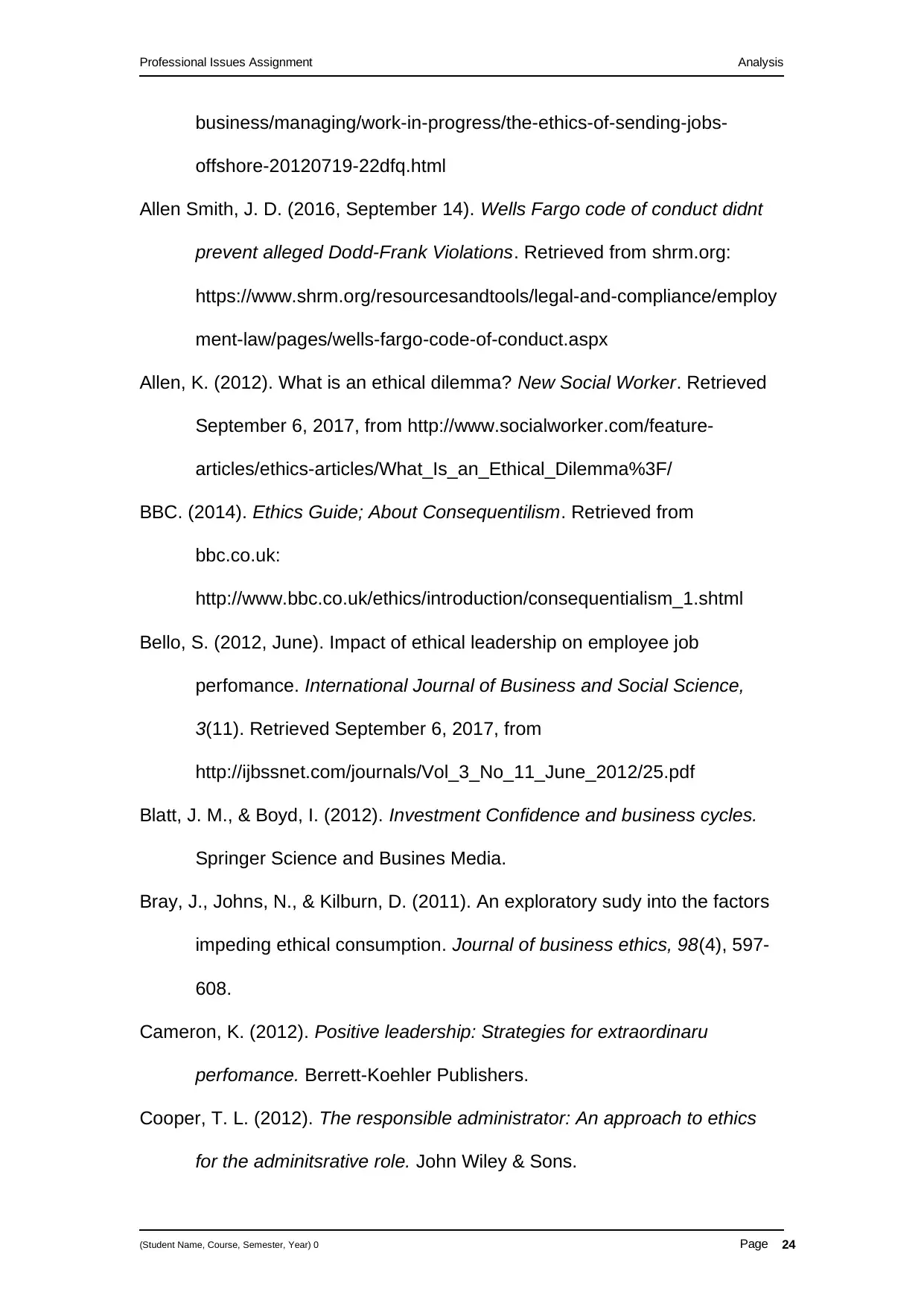
Professional Issues Assignment Analysis
business/managing/work-in-progress/the-ethics-of-sending-jobs-
offshore-20120719-22dfq.html
Allen Smith, J. D. (2016, September 14). Wells Fargo code of conduct didnt
prevent alleged Dodd-Frank Violations. Retrieved from shrm.org:
https://www.shrm.org/resourcesandtools/legal-and-compliance/employ
ment-law/pages/wells-fargo-code-of-conduct.aspx
Allen, K. (2012). What is an ethical dilemma? New Social Worker. Retrieved
September 6, 2017, from http://www.socialworker.com/feature-
articles/ethics-articles/What_Is_an_Ethical_Dilemma%3F/
BBC. (2014). Ethics Guide; About Consequentilism. Retrieved from
bbc.co.uk:
http://www.bbc.co.uk/ethics/introduction/consequentialism_1.shtml
Bello, S. (2012, June). Impact of ethical leadership on employee job
perfomance. International Journal of Business and Social Science,
3(11). Retrieved September 6, 2017, from
http://ijbssnet.com/journals/Vol_3_No_11_June_2012/25.pdf
Blatt, J. M., & Boyd, I. (2012). Investment Confidence and business cycles.
Springer Science and Busines Media.
Bray, J., Johns, N., & Kilburn, D. (2011). An exploratory sudy into the factors
impeding ethical consumption. Journal of business ethics, 98(4), 597-
608.
Cameron, K. (2012). Positive leadership: Strategies for extraordinaru
perfomance. Berrett-Koehler Publishers.
Cooper, T. L. (2012). The responsible administrator: An approach to ethics
for the adminitsrative role. John Wiley & Sons.
(Student Name, Course, Semester, Year) 0 Page 24
business/managing/work-in-progress/the-ethics-of-sending-jobs-
offshore-20120719-22dfq.html
Allen Smith, J. D. (2016, September 14). Wells Fargo code of conduct didnt
prevent alleged Dodd-Frank Violations. Retrieved from shrm.org:
https://www.shrm.org/resourcesandtools/legal-and-compliance/employ
ment-law/pages/wells-fargo-code-of-conduct.aspx
Allen, K. (2012). What is an ethical dilemma? New Social Worker. Retrieved
September 6, 2017, from http://www.socialworker.com/feature-
articles/ethics-articles/What_Is_an_Ethical_Dilemma%3F/
BBC. (2014). Ethics Guide; About Consequentilism. Retrieved from
bbc.co.uk:
http://www.bbc.co.uk/ethics/introduction/consequentialism_1.shtml
Bello, S. (2012, June). Impact of ethical leadership on employee job
perfomance. International Journal of Business and Social Science,
3(11). Retrieved September 6, 2017, from
http://ijbssnet.com/journals/Vol_3_No_11_June_2012/25.pdf
Blatt, J. M., & Boyd, I. (2012). Investment Confidence and business cycles.
Springer Science and Busines Media.
Bray, J., Johns, N., & Kilburn, D. (2011). An exploratory sudy into the factors
impeding ethical consumption. Journal of business ethics, 98(4), 597-
608.
Cameron, K. (2012). Positive leadership: Strategies for extraordinaru
perfomance. Berrett-Koehler Publishers.
Cooper, T. L. (2012). The responsible administrator: An approach to ethics
for the adminitsrative role. John Wiley & Sons.
(Student Name, Course, Semester, Year) 0 Page 24
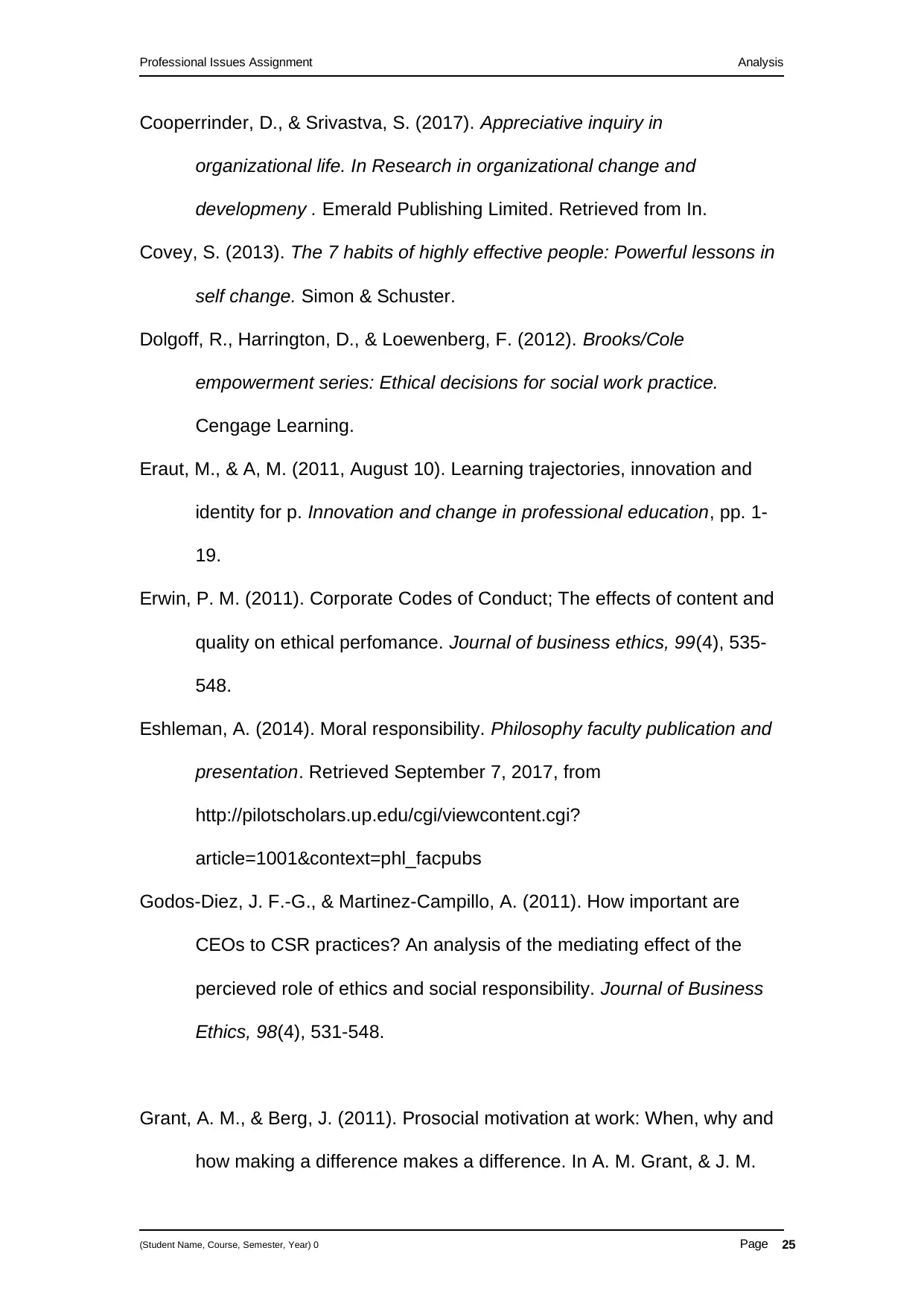
Professional Issues Assignment Analysis
Cooperrinder, D., & Srivastva, S. (2017). Appreciative inquiry in
organizational life. In Research in organizational change and
developmeny . Emerald Publishing Limited. Retrieved from In.
Covey, S. (2013). The 7 habits of highly effective people: Powerful lessons in
self change. Simon & Schuster.
Dolgoff, R., Harrington, D., & Loewenberg, F. (2012). Brooks/Cole
empowerment series: Ethical decisions for social work practice.
Cengage Learning.
Eraut, M., & A, M. (2011, August 10). Learning trajectories, innovation and
identity for p. Innovation and change in professional education, pp. 1-
19.
Erwin, P. M. (2011). Corporate Codes of Conduct; The effects of content and
quality on ethical perfomance. Journal of business ethics, 99(4), 535-
548.
Eshleman, A. (2014). Moral responsibility. Philosophy faculty publication and
presentation. Retrieved September 7, 2017, from
http://pilotscholars.up.edu/cgi/viewcontent.cgi?
article=1001&context=phl_facpubs
Godos-Diez, J. F.-G., & Martinez-Campillo, A. (2011). How important are
CEOs to CSR practices? An analysis of the mediating effect of the
percieved role of ethics and social responsibility. Journal of Business
Ethics, 98(4), 531-548.
Grant, A. M., & Berg, J. (2011). Prosocial motivation at work: When, why and
how making a difference makes a difference. In A. M. Grant, & J. M.
(Student Name, Course, Semester, Year) 0 Page 25
Cooperrinder, D., & Srivastva, S. (2017). Appreciative inquiry in
organizational life. In Research in organizational change and
developmeny . Emerald Publishing Limited. Retrieved from In.
Covey, S. (2013). The 7 habits of highly effective people: Powerful lessons in
self change. Simon & Schuster.
Dolgoff, R., Harrington, D., & Loewenberg, F. (2012). Brooks/Cole
empowerment series: Ethical decisions for social work practice.
Cengage Learning.
Eraut, M., & A, M. (2011, August 10). Learning trajectories, innovation and
identity for p. Innovation and change in professional education, pp. 1-
19.
Erwin, P. M. (2011). Corporate Codes of Conduct; The effects of content and
quality on ethical perfomance. Journal of business ethics, 99(4), 535-
548.
Eshleman, A. (2014). Moral responsibility. Philosophy faculty publication and
presentation. Retrieved September 7, 2017, from
http://pilotscholars.up.edu/cgi/viewcontent.cgi?
article=1001&context=phl_facpubs
Godos-Diez, J. F.-G., & Martinez-Campillo, A. (2011). How important are
CEOs to CSR practices? An analysis of the mediating effect of the
percieved role of ethics and social responsibility. Journal of Business
Ethics, 98(4), 531-548.
Grant, A. M., & Berg, J. (2011). Prosocial motivation at work: When, why and
how making a difference makes a difference. In A. M. Grant, & J. M.
(Student Name, Course, Semester, Year) 0 Page 25
Paraphrase This Document
Need a fresh take? Get an instant paraphrase of this document with our AI Paraphraser
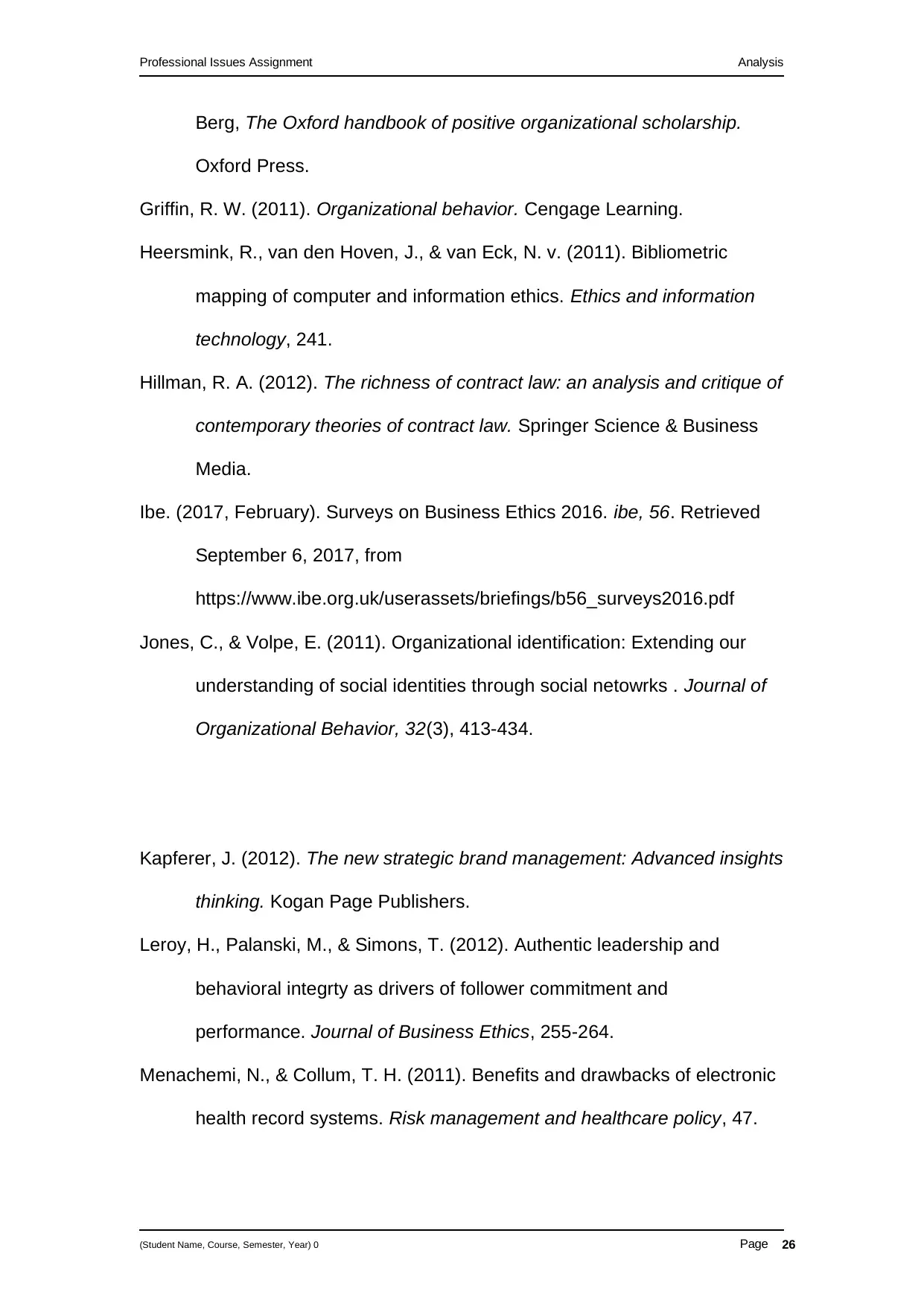
Professional Issues Assignment Analysis
Berg, The Oxford handbook of positive organizational scholarship.
Oxford Press.
Griffin, R. W. (2011). Organizational behavior. Cengage Learning.
Heersmink, R., van den Hoven, J., & van Eck, N. v. (2011). Bibliometric
mapping of computer and information ethics. Ethics and information
technology, 241.
Hillman, R. A. (2012). The richness of contract law: an analysis and critique of
contemporary theories of contract law. Springer Science & Business
Media.
Ibe. (2017, February). Surveys on Business Ethics 2016. ibe, 56. Retrieved
September 6, 2017, from
https://www.ibe.org.uk/userassets/briefings/b56_surveys2016.pdf
Jones, C., & Volpe, E. (2011). Organizational identification: Extending our
understanding of social identities through social netowrks . Journal of
Organizational Behavior, 32(3), 413-434.
Kapferer, J. (2012). The new strategic brand management: Advanced insights
thinking. Kogan Page Publishers.
Leroy, H., Palanski, M., & Simons, T. (2012). Authentic leadership and
behavioral integrty as drivers of follower commitment and
performance. Journal of Business Ethics, 255-264.
Menachemi, N., & Collum, T. H. (2011). Benefits and drawbacks of electronic
health record systems. Risk management and healthcare policy, 47.
(Student Name, Course, Semester, Year) 0 Page 26
Berg, The Oxford handbook of positive organizational scholarship.
Oxford Press.
Griffin, R. W. (2011). Organizational behavior. Cengage Learning.
Heersmink, R., van den Hoven, J., & van Eck, N. v. (2011). Bibliometric
mapping of computer and information ethics. Ethics and information
technology, 241.
Hillman, R. A. (2012). The richness of contract law: an analysis and critique of
contemporary theories of contract law. Springer Science & Business
Media.
Ibe. (2017, February). Surveys on Business Ethics 2016. ibe, 56. Retrieved
September 6, 2017, from
https://www.ibe.org.uk/userassets/briefings/b56_surveys2016.pdf
Jones, C., & Volpe, E. (2011). Organizational identification: Extending our
understanding of social identities through social netowrks . Journal of
Organizational Behavior, 32(3), 413-434.
Kapferer, J. (2012). The new strategic brand management: Advanced insights
thinking. Kogan Page Publishers.
Leroy, H., Palanski, M., & Simons, T. (2012). Authentic leadership and
behavioral integrty as drivers of follower commitment and
performance. Journal of Business Ethics, 255-264.
Menachemi, N., & Collum, T. H. (2011). Benefits and drawbacks of electronic
health record systems. Risk management and healthcare policy, 47.
(Student Name, Course, Semester, Year) 0 Page 26
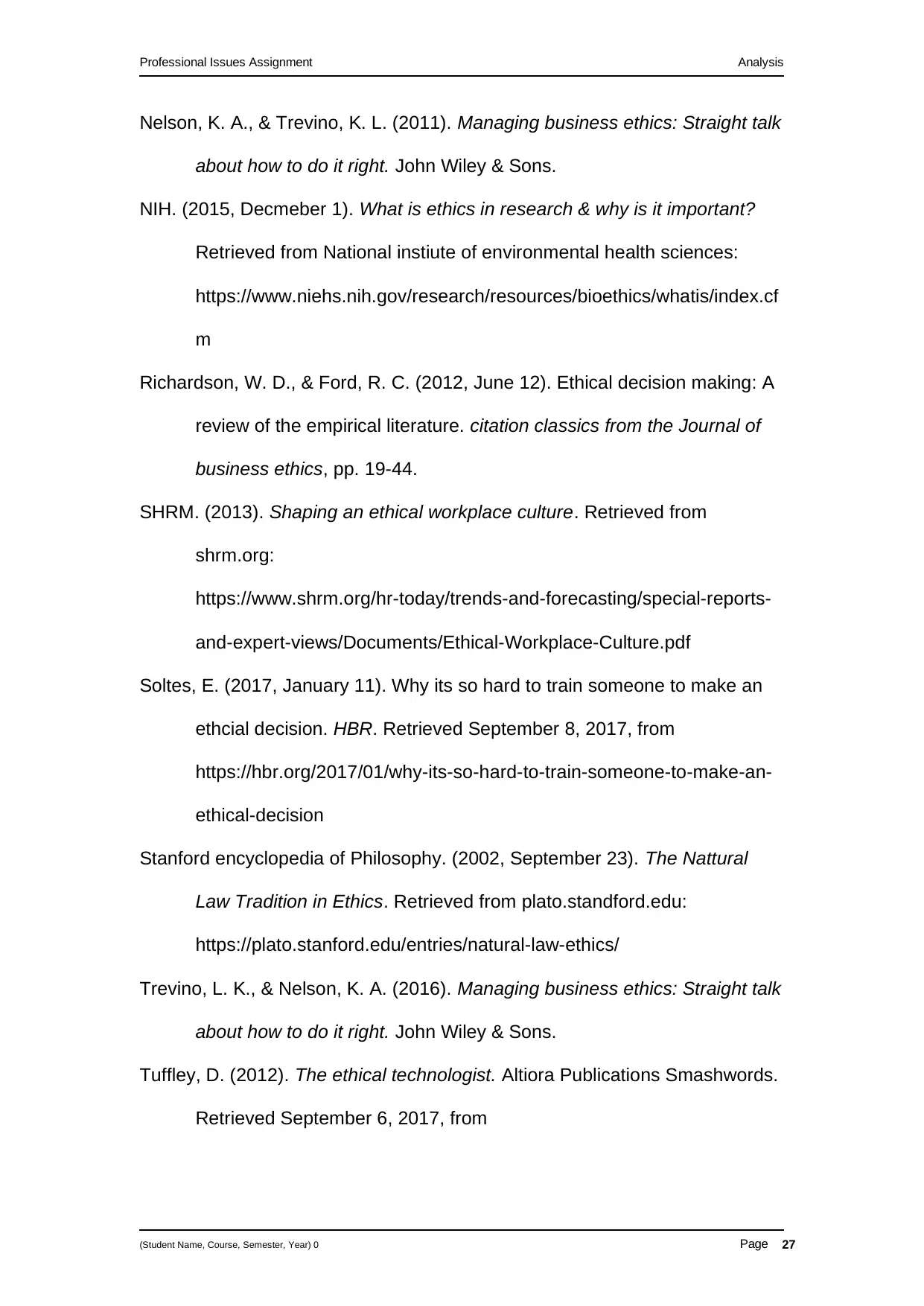
Professional Issues Assignment Analysis
Nelson, K. A., & Trevino, K. L. (2011). Managing business ethics: Straight talk
about how to do it right. John Wiley & Sons.
NIH. (2015, Decmeber 1). What is ethics in research & why is it important?
Retrieved from National instiute of environmental health sciences:
https://www.niehs.nih.gov/research/resources/bioethics/whatis/index.cf
m
Richardson, W. D., & Ford, R. C. (2012, June 12). Ethical decision making: A
review of the empirical literature. citation classics from the Journal of
business ethics, pp. 19-44.
SHRM. (2013). Shaping an ethical workplace culture. Retrieved from
shrm.org:
https://www.shrm.org/hr-today/trends-and-forecasting/special-reports-
and-expert-views/Documents/Ethical-Workplace-Culture.pdf
Soltes, E. (2017, January 11). Why its so hard to train someone to make an
ethcial decision. HBR. Retrieved September 8, 2017, from
https://hbr.org/2017/01/why-its-so-hard-to-train-someone-to-make-an-
ethical-decision
Stanford encyclopedia of Philosophy. (2002, September 23). The Nattural
Law Tradition in Ethics. Retrieved from plato.standford.edu:
https://plato.stanford.edu/entries/natural-law-ethics/
Trevino, L. K., & Nelson, K. A. (2016). Managing business ethics: Straight talk
about how to do it right. John Wiley & Sons.
Tuffley, D. (2012). The ethical technologist. Altiora Publications Smashwords.
Retrieved September 6, 2017, from
(Student Name, Course, Semester, Year) 0 Page 27
Nelson, K. A., & Trevino, K. L. (2011). Managing business ethics: Straight talk
about how to do it right. John Wiley & Sons.
NIH. (2015, Decmeber 1). What is ethics in research & why is it important?
Retrieved from National instiute of environmental health sciences:
https://www.niehs.nih.gov/research/resources/bioethics/whatis/index.cf
m
Richardson, W. D., & Ford, R. C. (2012, June 12). Ethical decision making: A
review of the empirical literature. citation classics from the Journal of
business ethics, pp. 19-44.
SHRM. (2013). Shaping an ethical workplace culture. Retrieved from
shrm.org:
https://www.shrm.org/hr-today/trends-and-forecasting/special-reports-
and-expert-views/Documents/Ethical-Workplace-Culture.pdf
Soltes, E. (2017, January 11). Why its so hard to train someone to make an
ethcial decision. HBR. Retrieved September 8, 2017, from
https://hbr.org/2017/01/why-its-so-hard-to-train-someone-to-make-an-
ethical-decision
Stanford encyclopedia of Philosophy. (2002, September 23). The Nattural
Law Tradition in Ethics. Retrieved from plato.standford.edu:
https://plato.stanford.edu/entries/natural-law-ethics/
Trevino, L. K., & Nelson, K. A. (2016). Managing business ethics: Straight talk
about how to do it right. John Wiley & Sons.
Tuffley, D. (2012). The ethical technologist. Altiora Publications Smashwords.
Retrieved September 6, 2017, from
(Student Name, Course, Semester, Year) 0 Page 27
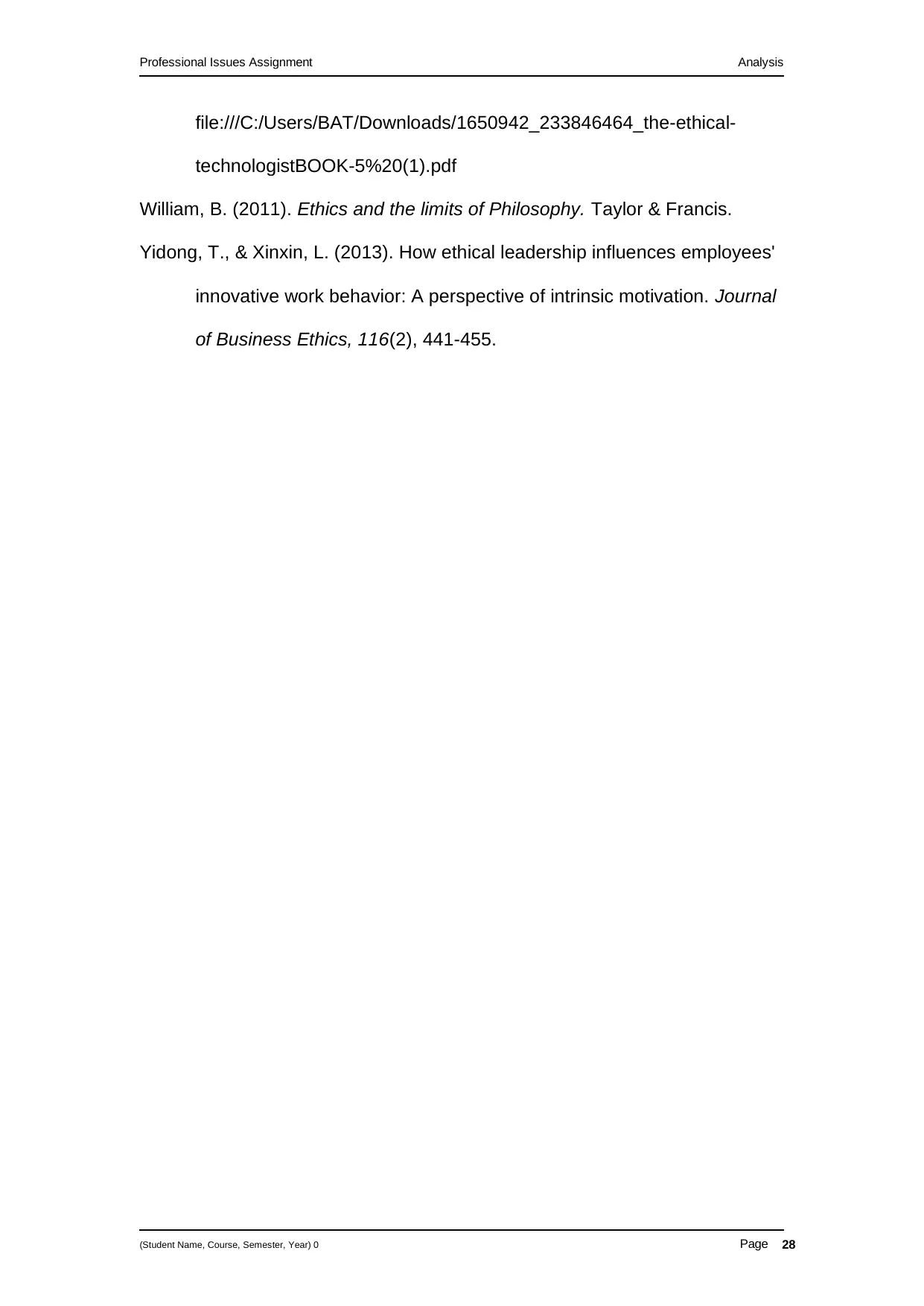
Professional Issues Assignment Analysis
file:///C:/Users/BAT/Downloads/1650942_233846464_the-ethical-
technologistBOOK-5%20(1).pdf
William, B. (2011). Ethics and the limits of Philosophy. Taylor & Francis.
Yidong, T., & Xinxin, L. (2013). How ethical leadership influences employees'
innovative work behavior: A perspective of intrinsic motivation. Journal
of Business Ethics, 116(2), 441-455.
(Student Name, Course, Semester, Year) 0 Page 28
file:///C:/Users/BAT/Downloads/1650942_233846464_the-ethical-
technologistBOOK-5%20(1).pdf
William, B. (2011). Ethics and the limits of Philosophy. Taylor & Francis.
Yidong, T., & Xinxin, L. (2013). How ethical leadership influences employees'
innovative work behavior: A perspective of intrinsic motivation. Journal
of Business Ethics, 116(2), 441-455.
(Student Name, Course, Semester, Year) 0 Page 28
1 out of 28
Related Documents
Your All-in-One AI-Powered Toolkit for Academic Success.
+13062052269
info@desklib.com
Available 24*7 on WhatsApp / Email
![[object Object]](/_next/static/media/star-bottom.7253800d.svg)
Unlock your academic potential
© 2024 | Zucol Services PVT LTD | All rights reserved.





